#i’m rambling because i say so
Explore tagged Tumblr posts
Text
You know what time it is?? Me rambling about season 2 again. This time, I wanna talk about some stuff a family member mention about regarding Aziraphale’s action and whatnot since it never really left my mind, mostly because I can’t help but disagree.
My family member first mentioned how Aziraphale could’ve told Metatron to give him a minute and talk to Crowley before going to the elevator and how they were mad that he step inside anyway.
Okay I want to prefix by saying, don’t we all? I do think the fandom are ready to see him to do an apology dance more than Michael Sheen himself. But what they said about this, and look I feel this might be unpopular but: Metatron would not have giving Aziraphale another chance nor did Aziraphale had a choice really.
“Phantom why you say that?”
Because, Metatron hooked him into a trap by saying Aziraphale’s favorite word, “Crowley” and the fact that he get to come with him. Which, think about it, Aziraphale wasn’t giving Heaven a second thought it wasn’t until Gabriel and the shenanigans came in is when heaven became the focus again. And then Metatron give him a promotion and like many have pointed out, he said no. But once Crowley came into the picture, he was ready to share the “big news”. And one thing about Aziraphale is while he clever, like my family member said he ultimately chooses became ignorant and almost refusing to see the gapping red flag. It kinda like when an intense scene is happening and you want to cover your eyes but you still wanna look? That’s kinda what Aziraphale doing just he covering his eyes in an effort to not see the alarm bell ringing but still looking since deep down he know something isn’t right, even Crowley is telling him “something smell absolutely foul”. Even then, he still is not looking at the bigger picture, he’s more or less focusing onto the fact that he could possible make heaven/earth better and to have Crowley there. But that not what Crowley wants.

And of course, we see that Crowley ends up being right, the second coming is happening. Which is why he look back at Crowley, this is where my family member said “he could’ve told metatron to wait and go to Crowley to tell him about the second coming” which, um, given that as soon as Crowley left after Aziraphale said “I forgive you” (that hurts writing it wtf Aziraphale), metatron simultaneous showed up not letting Aziraphale process what just happen, he was just kissed by his crush- no, his love interest. His best friend since the beginning of time/garden of Eden. (And with implication, most likely kissed back).

Look, I’m not the best with social cues/facial expression. However, seeing just his eye, you can see him going through the motions, you can see that he place his hand on his lips. Even when his eyes are glassy, he not only processing the kiss but what he just said to his best friend, his partner in crime, his love interest; and that is breaking his heart just as much as it broke Crowley’s heart, but he wasn’t giving that choice to dwell because guess who shows up after divorcing their unofficial official marriage for them:

And this that, Aziraphale had to go, he agreed to take up this offer. Even if Crowley wasn’t gonna go or not (which remember this imma bring it up later), and so he kinda had to take the L and go with metatron. Now going back to metatron reveal the thing Crowley was talking about. Could Aziraphale had told metatron to wait so he goes back to Crowley? I mean he could’ve but who to say Metatron was even going to give him the time of day if he wasn’t going to let Aziraphale process what transpired? Metatron doesn’t want any more setbacks, he needed Aziraphale and he did. He won. But also, I feel Aziraphale felt he burnt his bridges and is afraid to go up to Crowley to say he was right, especially since I don’t think that not what he wants to hear, but you bet that if metatron wasn’t there, he would’ve so ran to Crowley in a heartbeat. But he can’t. He going back into the box he created before meeting Crowley and so he walked away with metatron to the elevator.

Now thinking about it, this look reminds me when Crowley first suggesting running away to Alpha Centauri. He’s exhibiting that he does want to go off with Crowley; he want nothing more than to go toward or even be with Crowley. But what do both these instances have in common? is that Heaven is what tying his hands down. Only this time, he think he can’t because he felt he betrayed and lost Crowley and now he has to go back and hope to make things better and not let the world die again. So that’s why I feel Metatron wasn’t gonna give him another chance or that Aziraphale had any liberties; I did mentioned this on my Aziraphale post about how heaven prevents him to progress as a angel/person or let him have a say without being judged. Hell metaton called Muriel “dim”, I think Aziraphale more than anything want to satisfy his hopeless romantic desire and run away with him, but I feel his love for humanity is also the factor as earth is where they made all the memories, all their growth, and much more. Frankly, Aziraphale was put between a rock and a hard place, and Metatron was never going to make this easy. It like in Season 1, Episode 4, when we first met him, right off the bat Metatron lays it out that armageddon is the key to start the war and win it; like the other angels he’s just as war hungry and doesn’t care about humanity. Now that episode he didn’t drag him back to heaven but he did warn him not to stall, so I don’t think this situation is any different as he doesn’t want any more setback, he want the second coming to happen no matter the damage he caused. He. Does. Not. Care. For. Aziraphale. (Or anybody/anything in that matter). He can switch it up and act gentle and kind but underneath it all; he just want blood from the demons and win this biblical holy war because it’s “the ineffable plan”. So I don’t think Metatron would’ve giving Aziraphale another minute in earth because he doesn’t want to waste anymore time and frankly there most likely something about Aziraphale he needs. Because he could’ve promoted Michael or Uriel or even Saraqael, but no. Something about Aziraphale he needs and he need him to start up the plan and he can’t wait.
Now another thing my family member brings up is that, Azirphale want to change Crowley and make him an angel again.
Look, it might seem that way and I can understand how it can seem that way given the scene. However, I disagree because, given they’ve spent millennia together I don’t think Azirpahale want to change Crowley at all. Now sure, have he ever make comment about Crowley being a demon? Yeah of course, as well as Crowley make comment about Aziraphale being an angel (*cough* Jobs episode is a prime example) but not once have he ever make a remark or show he want Crowley to change by any means. If that was the case, don’t you think he would’ve stayed friend let alone fall in love with Crowley if he wanted him to change?

Look at that smile, oh wait actually let me prove more


Okay to refrain myself from showing more of these husbands/spouses/wives (whichever you prefer ^^), the point I’m trying to make is Aziraphale would never ask Crowley to change himself because in his eyes he’s already perfect. He was perfect when he first met him as an angel and he was just as perfect when they met again at the garden. Now of course, in Episode two of season two, he does kinda make remark regarding Crowley’s morals but I toke that as the fact that Aziraphale only knows the morals that heaven defined for them and sure Azirphale have shown to follow his own moral compass like giving the sword away and saving job’s kids but given that he had a breakdown because he thought he was going to fall just for saving kids, we got a glimpse of him battling with morals and even still is now. Even back in, season one even thought he wants to stop armageddon still almost follows heaven, episode 3, he tried to back pedal and even went as far as try to convince himself that he doesn’t like Crowley (yeah okay Aziraphale surreeee 🤨). I do think season 2, is another example between the flashbacks and the current timeline. Episode three of season 2 kinda show the flaw in what Aziraphale’s idea of moral taught by heaven, just because what you think is right ≠ good morals (at least not always anyway.) he sabotage Elspeth during her job because he fear this whole thing was sinful and would damn her soul despite the fact the only reason she did it is to survive the streets of Edinburgh. Sure you can say it not the best way but given the context she most likely don’t have a lot of options. I just think, Aziraphale refused to accept the fact that he’s morally grey (I almost said he struggles, but I want to give him props that he clever enough to know that he isn’t morally white.) and want to see things black and white not knowing there a grey line in between those colors.

But I digress, even with this, Aziraphale accept and respect Crowley’s morals within the six thousand years they’ve known each other. He respects Crowley as a person too, he trust him with his life. (This is them toasting after Aziraphale almost died twice in one day both the church and a magic trick. What a day.) i don’t think he would want to change that, I mean this is the same year he had an epiphany that he loves Crowley.

Now, imma go into the status with Aziraphale wanting Crowley to be an angel again. Now said this in the beginning of this paragraph, and while sure with this it does seem like he want to change him But, I think this is more or less wanting to give Crowley the title he deserve after falling for something so simple as asking a question. (Again we don’t know why he fell, we still going within implication until season 3 get confirmed. I’m just throwing this out there). Aziraphale see this as wanting to give Crowley back the title that was rightfully his and want to change heaven with Crowley; he know how Crowley feel about heaven, he deeply disagrees with heaven and their views on their twist ideology. We seen him comment on this within season 1/2, with garden of eden, the flood, job, and armageddon itself and Aziraphale despite hiding it, agrees with him. So I think aziraphale was trying to use this as a way to tell Crowley, “Come with me, let’s go fix heaven and make things right. Let me give you a chance to come back after they wrongfully cast you out.” While also saying “I don’t want to go alone.”

“I need you”. Probably the most heartbreaking quote (besides no nightingales/I forgive you). Sure, even after he said “nothing last forever”, he still needs Crowley not just because he loves him both romantically and in a name of friendship. Because Crowley is his other half of the what complete him and he can’t imagine being without him. Again, he would NEVER have went to heaven if it wasn’t for the fact he could take Crowley. He wouldn’t want to change him, all he wanted is to fix heaven for/with crowley and want to save the world with Crowley. In his own way. not even seeing just how problematic it is for Aziraphale where even after the shit they put him through and even AFTER, when they try to execute him with HELLFIRE. He choose heaven ultimately, regardless if Crowley was gonna go or not. He already made his choice to leave and he unfortunately had to stick with it. Losing the things he love all in one day. Especially now with the second coming going into motion. I don’t doubt that if metatron wasn’t in the elevator that Aziraphale would’ve had a heart wrenching sob, I’m surprise he didn’t even shed a tear still. Man these biblical bitches are going through it and it breaking my heart each time I think more about this.
This is probably my longest post I’ve ever made, I think mostly because I needed to get this off my chest. Granted despite this, I respect their opinions. I’m just giving my two cent on this. So I’m open to hear you guy’s opinion on this. I love this show and this fandom and I don’t think it going away anytime soon. Neil Gaiman and the cast killed it with this show and the story and I’m excited for what season 3 might offer.
But before I stop, I do wanna mini ramble about how at first I couldn’t be able to listen to Everday without crying. (I might make a post about it. Maybe. Let’s see lol.) and at first I couldn’t put my finger on it until recently. I know everyday is more or less Ineffable  bureaucracy’s song; but I also see this as Ineffable husband’s song. Why? Well given how season 3 might be the last, I do think this song is foreshadowing their relationship and how it getting closer and their love will surely come their way. A-hey A-hey hey (I wanna say more but I don’t wanna talk more than I already did lol. Hope you guys like this post and have a good omen day ^^)
#good omens#aziraphale#crowley#good omens season 2#good omens 2#I’m rambling because I say so#ineffable husbands#these bitches are going to be the death of me#this show is my bread and butter and I eat it up everytime#this show will be the death of me#i love this show#good omens fandom#this brainrot is fucking up my mind and I don’t mind it#let me have this#ramblings#this post is so long I’m sorry 🥲#this is where i’m at with my brainrot#good omens spoilers#crowley good omens#fuck metatron me and the fandom are praying on their downfall
35 notes
·
View notes
Text
Falin who cares too much and too little - analysis
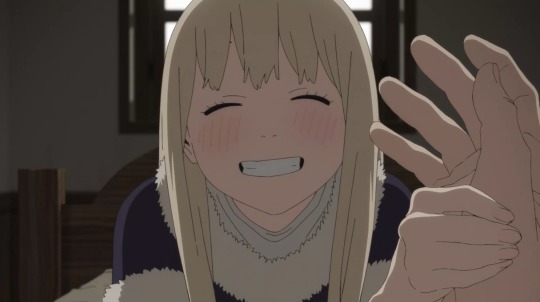
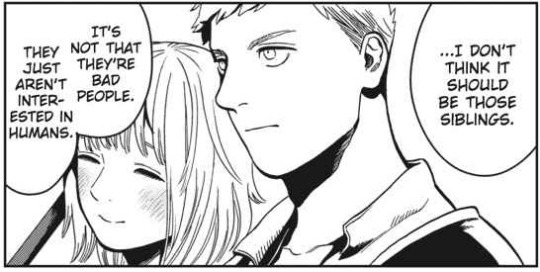
Been stewing on Falin thoughts for a while, I know I have an interpetation on her that differs from many but I’m jumping into the fray. I think there’s a lot to be said about what we do see of Falin. This shorter Falin analysis I made is heavily encouraged prior reading. This analysis mainly explores her complex relationship with caring and so it’s sort of structured in two halves, with Faligon at the crux of it all.
Falin cares too little :
A lot of people assign Falin a people pleasing mindset and I… Don’t agree. We never see her care at all about people in her town or at the academy not liking her.
We do see her worrying about what people think of her… ONCE. And Laios comforted her, told her they didn’t matter and she should be proud of herself. She latched onto that hard. That’s why this scene was so important to be included during the dragon fight, relationship-defining; it’s always been them against the world. She grew to not care what others thought, to only focus on her close loved ones. No one else matters.
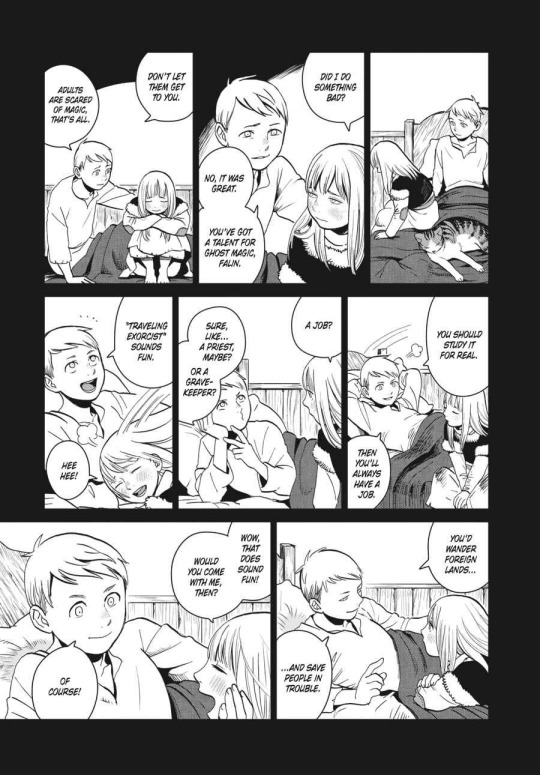
Laios’ words were her world. Her older brother who taught her how to feel comfortable with herself, who told her, you’re great, others are the ones in the wrong to not see that, I’ll always be with you, always be there for you. Older brother who always made great plans, who always knew more, who was better at wrestling to name the dogs, who she has always idolized. Laios who always spoke of traveling the world, to which she always said she wanted to follow. And she would, she’d follow him even if it meant leaving the academy and all she knew behind, she’d follow him to the ends of the world, and that’s what she did.
She didn’t care about showing to her classes or keeping up such appearances, she doesn’t even think of toning down her jumping into bushes when Marcille recoils, etc. She acts like an obedient pawn often, to her parent’s directives and then following Laios around no matter what he decides to do, but I don’t think the motivation is people pleasing, rather it’s being with & caring for her loved ones, and her go-with-the-flow attitude enhances the impression. Not that it’s as simple as that, mind you, but let’s talk about this for now.
Falin is perceived as selfless because we, the audience, have our perspectives revolving around the main people in her life (Laios, Marcille). They’re the ones she’s devoted to and people who care about her back a lot too, but to people like her classmates or the towspeople she probably must have seemed like someone who didn’t care about the people around her or her surroundings a lot, who just went on alone and did her own thing.
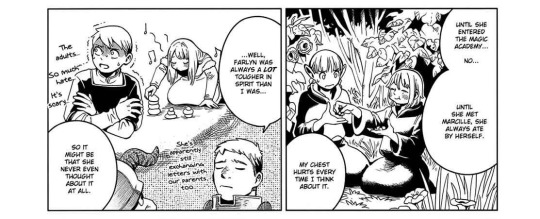
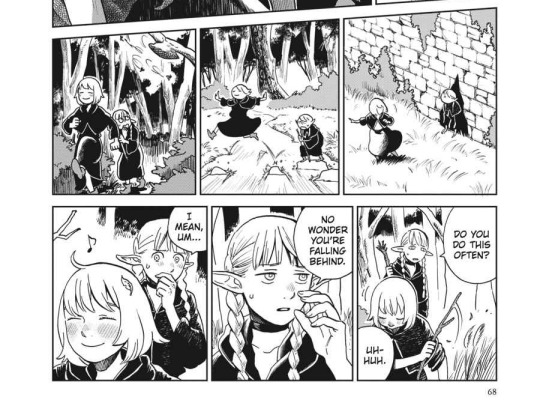
What matters to Falin? From what place does her kindness come from? Is a part of her keeping up appearances? And I think that’s the point, the horror of Faligon as well, that we can’t tell just how in control Falin the person is as the chimera (because we are shown that she’s in there, we just don’t know at what degree), that we don’t know her enough to be able to tell when she’s at her most genuine, her most raw. That even if you do settle on none of her being present as Faligon, we have to at least consider it, consider that she may be able to do something like this and have a part in it, brutal and uncaring. That even the lenses we see her through, the people who love her, may be unreliable.
And this is what’s very interesting about her too, she truly is so idealized by people around her as a saint. She’s so good and kind and caring to everyone etc etc etc. Laios, Toshiro and Marcille all see her as the paragon of goodness in the world. More cynical characters like Namari and Chilchuck have more layered opinions on her, the latter finding her somewhat unnerving because he can’t read her well. But then with that one flashback scene we see that… Her priorities are intensely focused on Laios and Marcille, she doesn’t care all that deeply about anyone other than them (+ maybe her parents). The rest of the party is in the same danger here but only Laios and Marcille who she’s speaking to get the special ,ention, and if they don’t cross her mind then of course she’d be ready to sacrifice strangers through a risky teleportation. That doesn’t make her not kind or caring!! Just that greater good isn’t exactly her priority. Any means is alright if the end result is her loved ones safe, it usually takes the form of healing and caring, but we see she’s ready to fight and make dangerous calls too. To me there’s this aspect to her that she isn’t as pure and magnanimous as everyone thinks she is, both in-world and interestingly enough meta wise as well, and there’s something interesting to that.
People pleasing implies a need to be liked, needs for the motivation to be that. A yes-man, etc. But if we analyze Falin, her general kind, smiling demeanor is more a matter of passivity I yhonk. Conflict avoidance is easier, so she’s friendly and hopefully things’ll be smooth sailing. It’s easy to be kind to classmates even if they act wary and rude if you don’t care about what they think either way. Of course she prefers good things happening to people over bad things, she is genuinely kind, but I think people tend to assign her a very grand altruistic way of life when to her the motivation is pretty self-centered. She doesn’t do what she does because she loves them, but because she loves them.
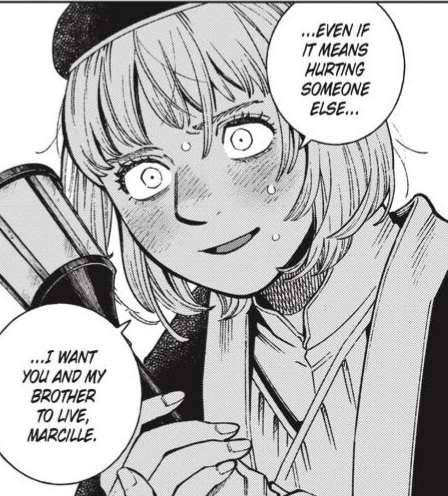
One situation that’s interesting to dig into for her way of thinking, and what I’m trying to get at, is Shuro’s proposal to her. I’ve seen people saying she hesitated because she didn’t feel comfortable saying no even though she wanted to, "I can’t say no, I don’t want to hurt him", something that sounds sensible and familiar, but it’s actually canon in the Adventurer’s Bible that the reverse was the case, that she didn’t feel comfortable saying yes. Because the offer was tempting, but it’d have been a loveless agreement on her end. And it makes sense she’d want to say yes too, like we see with the Toudens, marriage is very much a political strategical economical thing in their village, there’s even a bit on it on Laios’ Adventurer’s Bible profile about dowries, and both siblings were engaged very early. They lived poorly for a long time, it’s an enticing idea to marry rich, to have not only yours but your brother’s needs met forevermore easily, which at one point in their careers was their main worry and goal. Why shouldn’t she accept a life of leisure and wealth handed to her by a lovely friend?
So her hesitance was "yeah that’s convenient for me, but where it’s everything to him and heartfelt I’m able to be detached because I don’t care about it that much… Can I do that? I’m not reciprocating, not saying yes in the way that matters. Can I do that to him?" Very caring even though it’s not what you’d expect, isn’t it?
And central to my analysis, where I’m going with this is, I feel like that’s the thing with her character, that she doesn’t feel as strongly as she "should" sometimes, or feels a different way than she "should", or at least that she feels that way and others say she does. She didn’t mind suddenly leaving the academy, leaving Marcille behind and not seeing her for 4 years. She acted like it was no big deal that she sacrificed herself after getting resurrected after the red dragon fight. And in both those cases it upset the people around her greatly that she didn’t seem to get why it was such a big deal, didn’t seem to care about how they’d experienced her choices.
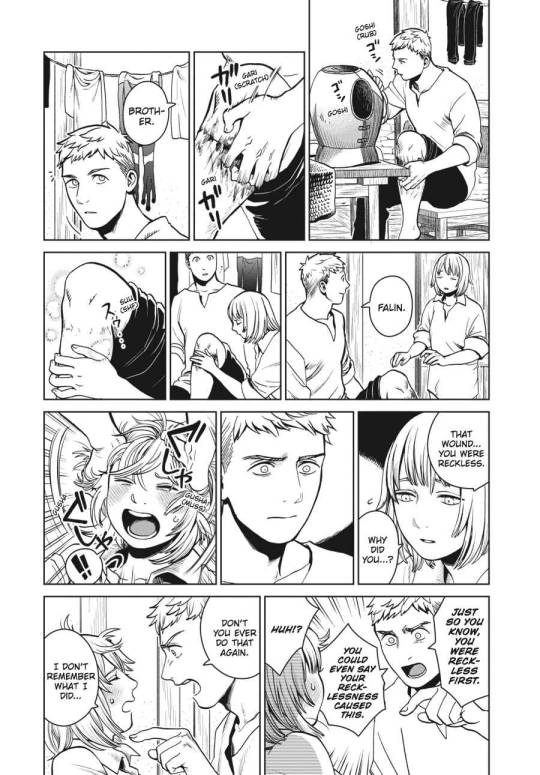
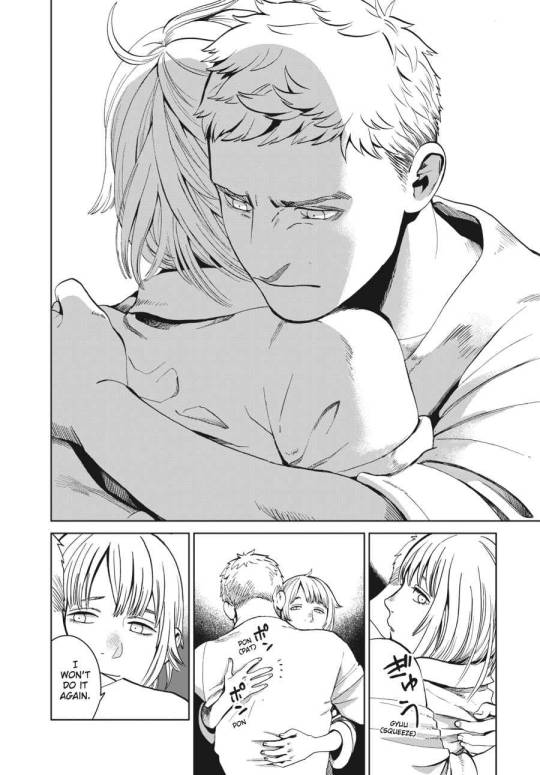
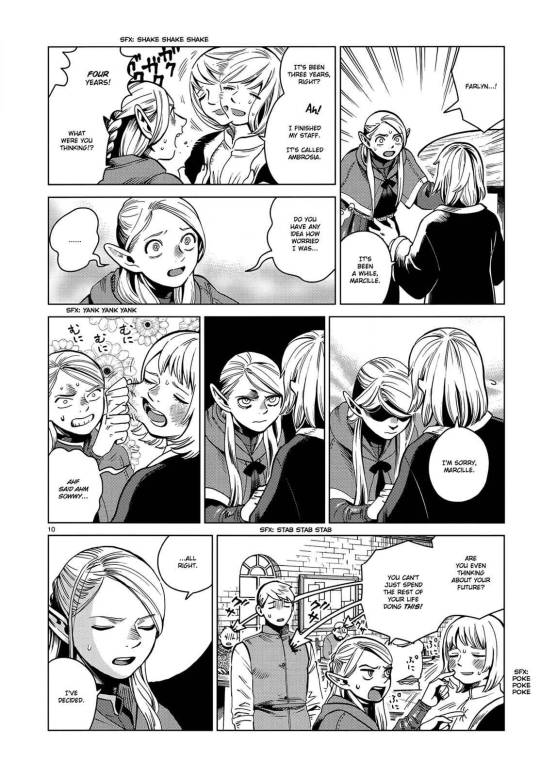
So it’s a tendency… And it’s not that she doesn’t care, it’s just that the way she measures what’s good for the ones she loves isn’t the same as what they themselves think it is (like Laios and Marcille not wanting to be apart from her). It’s an overt but quiet kind of care, it’s doing things like following them around and making sure they bathe and have a meal, even if that means she has to be dragged into misery too.
So yes she probably would know "not caring enough/the right way" is one of her perceived flaws, and that informs how she tries to handle her response to Shuro’s proposal. Her not wanting to accept like her first gut instinct, is because she’s thinking about reciprocity, about if it’d be right to go into this knowing that they have different priorities and she might not be able to keep up with the type and amount of emotions he wants/expects from her. And that’s a big part of her character isn’t it, having expectations pushed onto her. Her trying her best, but in her own way that may seem odd or even unfeeling. Not unlike when she exorcised the ghost as a kid too, unblinking and matter-of-factly, and not seeming to understand why people stared the way they did.
Even though she answered his proposal only post-canon, she’d been pondering it for a while even pre-canon and the Adventurer’s Bible explanation was released midstory, so I’m hesitant to assign her much growth about her hesitation and what I went on above, since she still didn’t react "right" with Laios after the red dragon fight (even if she apparently doesn’t remember sacrificing herself) and put herself in that situation in the first place. She hasn’t finished her arc on that flaw of hers is what I’m saying, she for sure still has it, but I certainly think her thoughts on Shuro’s proposal shows awareness, both of herself and social.
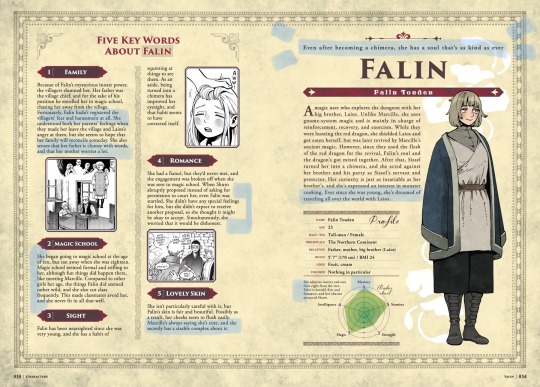
And awareness is a big analysis key word with Falin, especially here it can be hard not to conflate not caring with not knowing. How socially aware is she? It’s rather layered, because canonically she wasn’t aware of her ostracization in her hometown at all, and we’re not sure if she knew Shuro was interested in her before he proposed, but she generally seems more socially aware than Laios. She tags along on his caravan job to make sure he isn’t being mistreated (though doesn’t ask he get a salary), she catches social faux-pas more easily like in the genderbend magic mirror omake with Shuro, and interestingly enough she’s very good at empathizing with her parents and understanding their perspective. We see when she’s worried about Marcille coming that she does know about propriety and how appearances shape impressions. Being a chief’s daughter must at least have taught her a thing or two on that front.
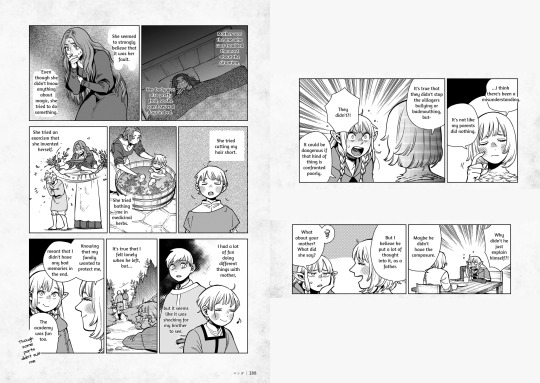
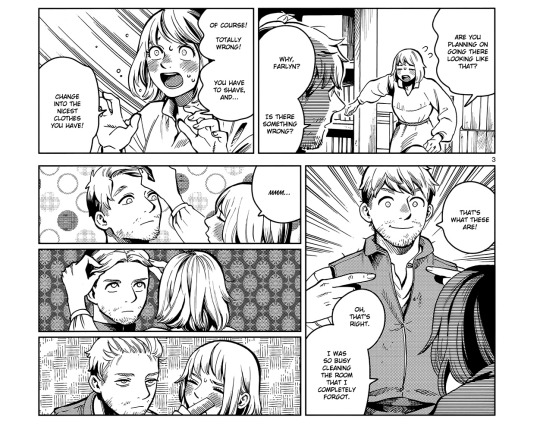
She never stands up for herself, but when it comes to defending others she worries, strategizes and explains.
And this sort of understanding is part of why I think she’d notice the expectations pushed onto her like I was saying earlier, notice how she makes people feel when she’s careless. But if she changes anything about herself in response to noticing is for her to choose, and generally I think it’s a sort of inbetween of yes and no: that she becomes more complacent but also more reserved, complying but by hiding more of herself passively. She’s not sure wether to accept or reject Shuro’s proposal, doesn’t want to lead him on? She’ll just be taking a while to silently consider it, try to keep things as they are for the time being. The third, less conflicting option. She doesn’t feel heard by Marcille who keeps infantilizing her? Just bear with it. Retract yourself emotionally. Settle for it.
We see that when she was young she had a tendency to not read a room, and I think that’s here too. She doesn’t get why her nonchalance upset others but that doesn’t change that she doesn’t want them upset or hurt, so she tries, albeit in maybe a roundabout way. She always had a hard time deeply connecting with people, often keeping herself some amount of emotionally distant: erasing herself from the equation, from the two-way trade that relationships are and making it a onesided thing instead, where all their needs and emotions are directed towards her but she only lets out a bit of her own show. She takes everything upon her and deals with it and tries not to give others this same burden, though not on a conscious level, it’s just that she’s learned growing up that she doesn’t have much agency.
Like I went into with my analysis linked at the beginning, I think Falin is used to just taking what she can get and not asking for more, when it comes to social bonds. She’ll take spending time with her mother no matter what it is they do, she’ll follow Laios to the graveyards and stick by him even when he’s pushing her away (because he doesn’t want her borrowing his book or "No copying!" or such). Her father was always distant, cold and uncommunicative, her mother was considered sick from anxiety and the exorcism attempts were the main way they spent time together, at dinner tables there were only her and Laios. The dogs picked on her too even if she loved them— And so did the townspeople, maybe that being normal to her at home is why she didn’t notice the ostracization she suffered.
She’s always been the last to be asked about decisions or what she wants, never asked to play with at recess, neither her father or Laios asked before sending her to the academy or leaving the village. At home, in the hierarchy she was considered to be below the dogs by the dogs themselves, as someone they can disrespect. Dogs learn from example and behavior, so this means Falin must have been pushed around a lot, and that the family didn’t try hard to rectify the dogs’ misconception, likely worsened by Laios regularly wrestling with her as a competition.
So for example when Falin showed Marcille food, it was her way to implicitly ask to have lunch with her without voicing that question, without daring to take up space. Someone’s presence isn’t something you ask for, it’s something that’s bestowed upon you, you can follow them around but you can’t ask them to stay or to come with.
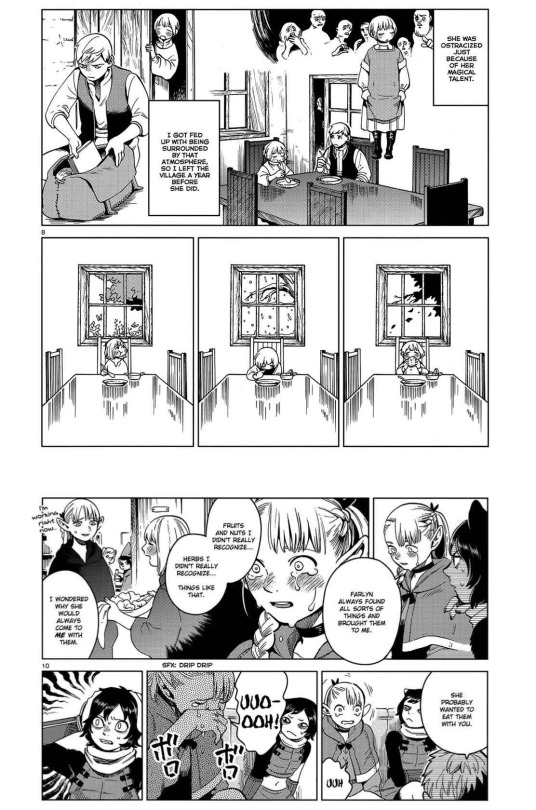
She’s used to her needs and wants not being listened to, so she’s learned to have less wants. Caring less about herself, caring less about other people beyond her safe zone, was a defense mechanism in part. She has a sense of learned helplessness too, like how when Marcille came to take her away from Laios, even though she didn’t want to leave with Marcille it felt so determined and unshakable to her that whatever Marcille decided Falin would have to comply with.
And still, it’s the "marrying you would be awfully convenient if it wasn’t that I’d feel guilty for not loving you back, the way you wanted me to when you proposed to me" and the "I don’t regret leaving the academy and leaving you behind without goodbyes but I’m sorry that you’re so much more upset about it than me". It’s the guilt of not loving people back the way they want to be, with the same intensity or fervor.
It’s the autism it’s the aroace of it all, it’s the emotional stunting and confusion but the pit in your stomach telling you you did something wrong again. The no object permanence even for people you love even for 4 years, it’s the feeling like you’re somehow at fault for someone having fallen for you and not knowing what to do with any of it. I’m not joking btw it isn’t uncommon for autistic people to not see their close friends for a long while, not having missed them all that much and for that to be really hurtful for the other if they notice/ask about it. "Hiii bestie! Oh umm you’re uh more emotional about this than I expected, hopefully you won’t feel alienated by me not feeling as intensely about it…"
So… Yeah. I think she thinks of things and relationships in a different way than most people, and beyond "good things happening to people is good" I don’t think she actually cares about people all that much. I’d argue that Laios shows more desire to connect with others and make relationships. And just like with Laios and his own issues with humans, that doesn’t mean her kindness is a lie or ungenuine or worthless! It just means that like, well it’s pretty straightforward really, she’s not all that social and doesn’t see casual bonds as meaning all that much and whatnot. She does want to see people happy, but it’s not as much like… A conviction or goal. She’s too laser focused on a select few people. "It’s not that they’re bad people, they just aren’t interested in humans."
And sometimes it feels like people get defensive about Falin in a meta way too, like if you ever so much as imply Marcille isn’t her whole world or that she isn’t the kindest soul out there then you’re saying she doesn’t care at all or she’s evil. And that’s actualy exactly the sort of vibe I wanted to get through with my analysis above here actually haha, that she does care and she is kind but it’s not in a way that’s quantified or understood in a way that makes people feel comfortable. In a way, that makes people feel insecure because they don’t have the same logic as her, don’t show love the same. And I think this is another stellar depiction of autism, of parts of it that feels unpalatable to many, if I’m making sense. The fandom idealizes her as well, which isn’t uncommon or surprising for the character embodying the trope of the perfect beloved to rescue.
And disclaimer, as I said in the tags I feel like the details of Falin are pretty vibe based when it comes to analysis, there’s absolutely a valid angle where she does super care about everyone always, feel free to disagree with me on the overarching angle of my analysis. There’s enough supporting evidence to tip the balance either way I think, and the reason I’ve chosen this angle is I feel it’s more compelling for the themes in Dunmeshi of idealization and being different, of desires vs wants, and because I think it neatly ties up Falin’s character arc as I’ll go over throughout the next section…
So.
Not feeling as much as she should. And……. Is this not Faligon pushed to the max?
You can’t tie down a dragon. As the chimera, she gets to just not care about everyone else and be on her merry way.
Part of it I think is finding comfort and freedom in the mindlessness, in not having the burden of feelings and connections and a consciousness (despite still ending up seeking those in a stranger, Thistle). Like when she’s dead in the purgatory as well, she gets to just… Hang around and do whatever. Similarly to when she played in the forest instead of going to class in her academy days. That’s what freedom and peace of mind looks like to her. Why she decides to roam post-canon, if only now with the goal to find herself instead, with her mind in tow and somewhere to go back home to.
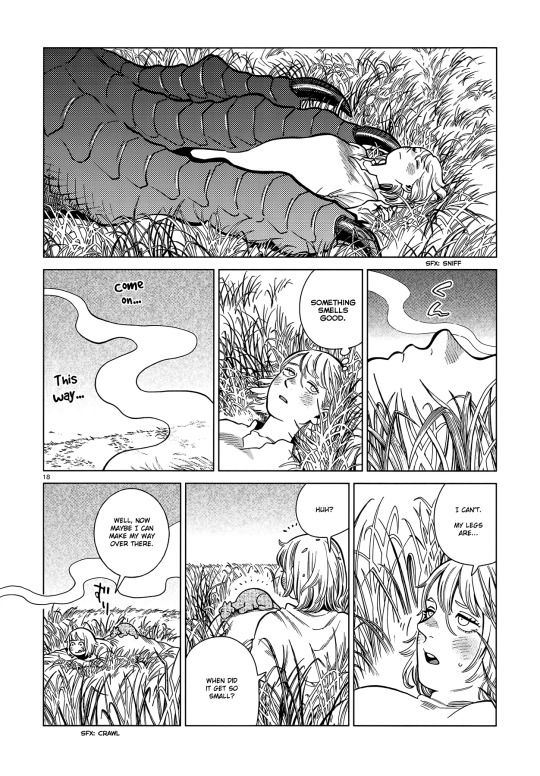
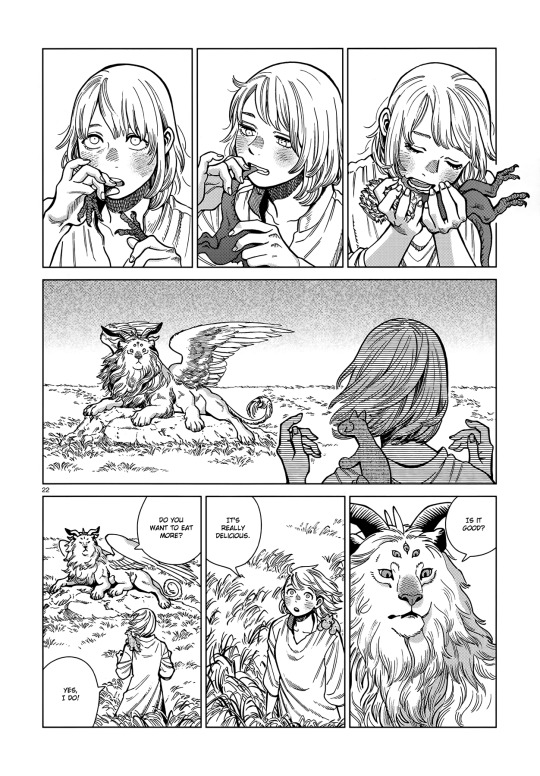
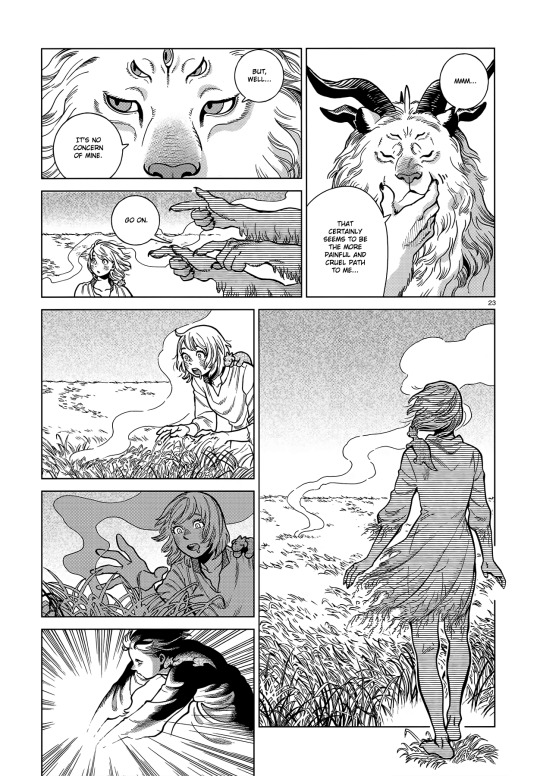
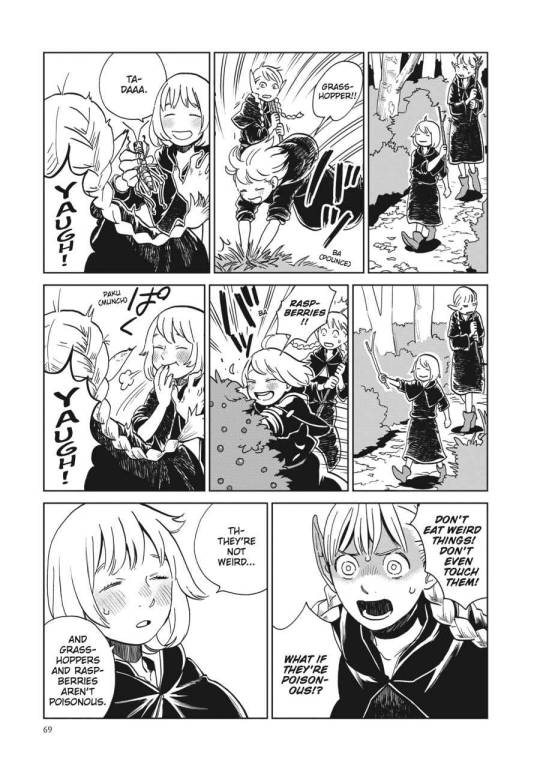
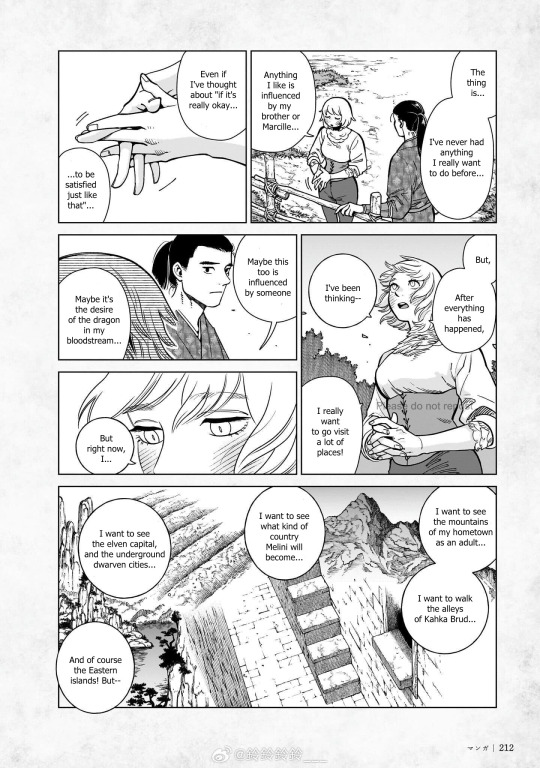
There’s excellent analytic framing out there about how of course, Dungeon Meshi has a big theme of grief and letting go, and… Falin was always a symbol narratively, idealized by characters and often underconsidered by them despite their love. It was Falin’s choice to sacrifice herself for Laios, she thought it was worth it, knowing that it would be her end. Her resurrection and the process of it intertwining her soul with a dragon’s wasn’t done with her consent, and the subsequent opening it gave her to become a chimera puppet. She’s stripped of her agency consistently, and so… It’s very noteworthy that the final choice, of wether to go back to life or to stay dead, in that purgatory scene, was up to her. And she chooses life, but I do think about her in those fields and how at home she seemed there. Peaceful, by herself in a vast calm expanse she could explore, free.
Personally, I think freedom is Falin’s own subconscious selfish desire. And though to us becoming the chimera is obviously a shackle, I think it felt like freedom to her somewhat, too.
And if you think I’m going wildly off the rails here I want to talk about Laios’ wish of becoming a monster. And to be clear before getting into it, being mentally a monster is absolutely a big part of the appeal for Laios, it’s something that’s consistently referred to, something especially pointed out in the werewolf monster tidbit with Lycion. Right panel is from that, but left panel is from the extra with Izutsumi where Lycion talks about suppressing souls in a beastkin body, the human or the beast soul.
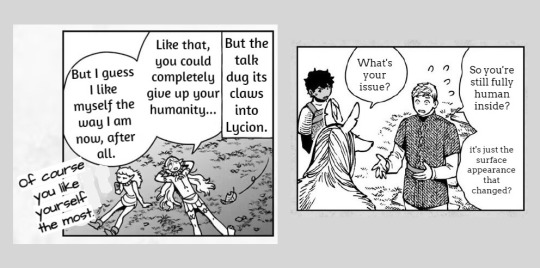
Finding comfort and freedom in being mindless, less sentient, less aware? While being unaware in her hometown might have saved Falin a lot of heartache although perhaps stunted her emotional growth, it’s always been Laios’ curse.
Actively, through his choices, he seeks to grow closer to people, to form deeper bonds, to understand and be undertood, but… On a deep seated level, what he desires is to leave humanity and civilization behind. He has an irrational hatred for humans, born from the trauma of ostracization, being different, being beaten up and rejected consistently through his life. Running away from problems is easier. He wants to be free from being a social animal from a social species who has deemed him the black sheep, he thinks it’d be simpler to just leave it all behind, people and his own humanity. At its core, to Laios becoming a monster is a power fantasy, a coping daydream of "if only I could be strong enough to never be hurt again, the power to destroy anything I want, the power to go somewhere better, if only it was possible for me to never feel hurt again. If only I could be someone, something, that can never be hurt". "If there’s someone you don’t like, you can gobble ‘em up in one bite. If you could fly, you’d be able to leave this village right now." It’s a childhood fantasy, from a deep sense of being misplaced and a desire to be able to stand fearless, thinly covering up resentment that Laios represses.
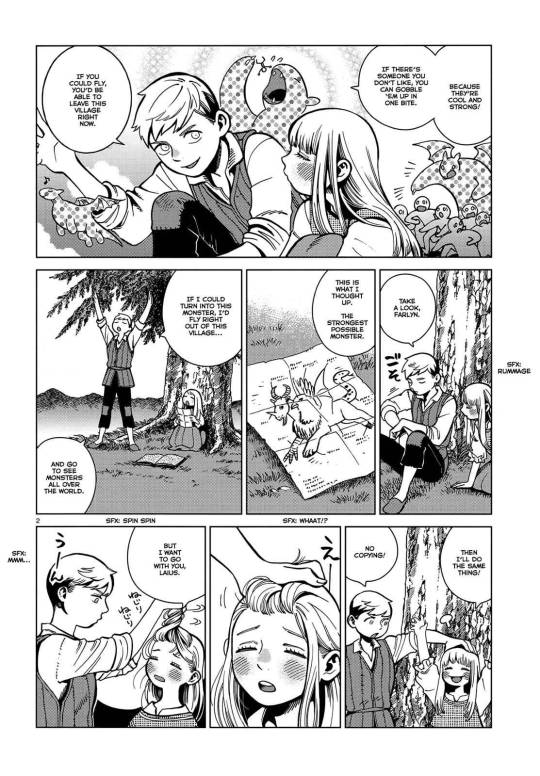
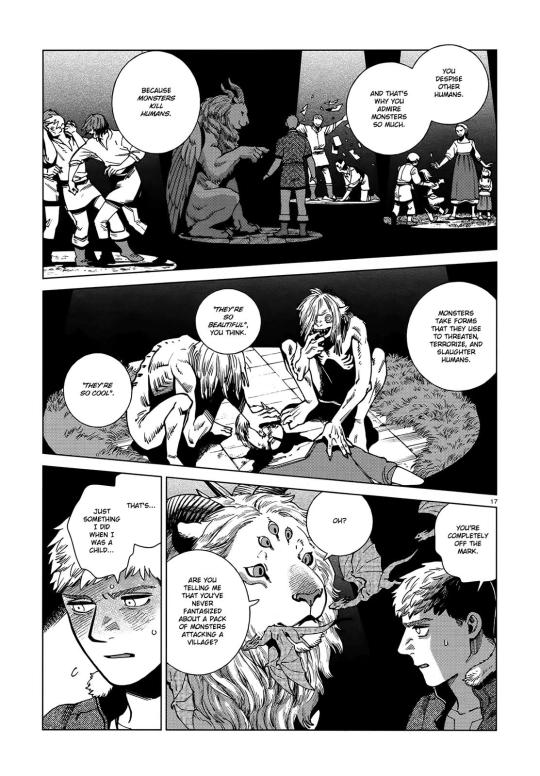
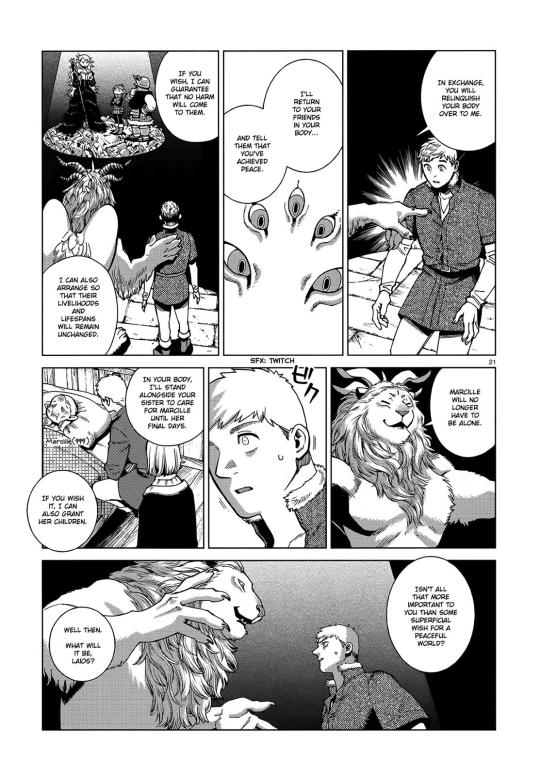
But you’ll notice, when the Winged Lion is enticing him in the last page, even now with his lifelong wish of becoming a monster on a silver plate, he still cares about his friends. He still has that sense of responsibility to his friends, doesn’t want to leave knowing they’ll be in danger and alone. The offer that his friends may be left unharmed is already good, but Laios also visibly flinches when the Winged Lion offers to specifically care after Marcille and rid her of her biggest fear. Laios’ care runs that deep. Not unlike with the succubus, he resists temptation until he gets reassured that everyone will be okay. But see, what he desires isn’t to stand alongside Marcille until her last days, it isn’t to stay and see how well his friends will live, it’s to go. It’s to leave. It’s to fly away, a monster both in body and mind. He wants to be free from caring here, wants to not have to worry about his friends, wants to just go do his own thing, but for that he needs to feel safe in the belief that said friends will be safe even without him being there to see it, because despite everything else he cares, he does. It’s again that dichotomy about caring and wishing you didn’t, or not caring and wishing you did.
In the end, it’s Falin who achieves that wish. Both by becoming a chimera during canon, and by going traveling post-canon. In the latter, being both free of human relationships as something chaining you while still being uplifted by them, by the knowledge that there are people out there you love and that love you. It’s a theme that can also be connected with Marcille, because she gets anxious over people she loves getting out of her sight, worrying they’ll get themselves killed, that time is passing while they’re away from her. But before she can get to the point where she can both have her freedom and being uplifted by her social bonds, regaining both her individuality and her connections, she has to get a taste of just one at a time. Before they can find balance in her life, she has to see what it’s like to have what she’s never had on its own. Unapologetic freedom, and power.
No one can blame you for not caring enough or caring right if you’re a fricking dragon!!!! You make the rules when you’re a beast and you can just… Fly away. From anywhere, from anything. And if a dog bites you you can just crush it. Instead of being pushed around by the dogs because you’re at the bottom of the hierarchy, you’re now at the top, the one with the power to be heard and do what you want without consequences.
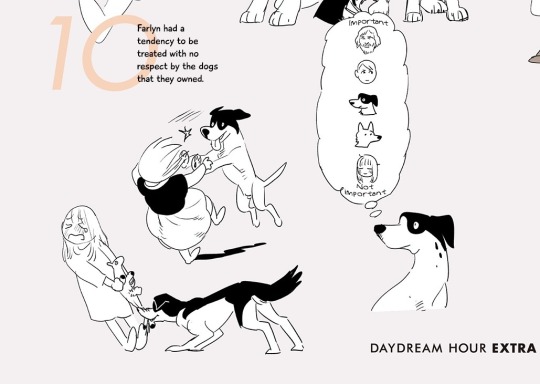
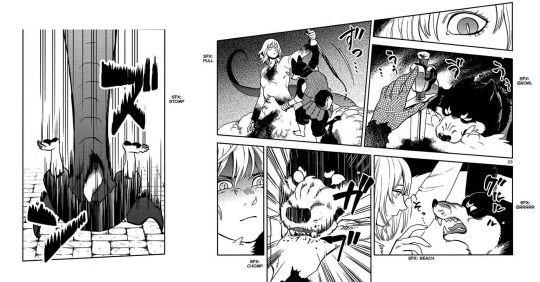
I think she’s on autopilot. I think she’s on autopilot a lot of the time, even before being a chimera, and it’s partly why her will is so weak compared to regular dragons. (Again, read my shorter analysis.) It’s familiar to slip back into the role of following someone around unquestioningly. And that’s what is weaponized when she’s a chimera, that instinct she’s been nursing all her life to unconditionally support, defend and follow someone. Only now, that someone doesn’t matter in itself, only the symbol of it. She doesn’t mind, either way is fine. Her will is weak after all, because she’s trained it to take as little place as it could.
Falin cares too much
She spends all her time caring for Laios and Marcille alternating that none of her care and emotional energy is left for others, including herself. So she had to get relieved of all of that for a bit, becoming the chimera so she could reset and recenter and remember that she, too, indeed, is there and an important part of her own life.
So you’re probably seeing the duality I’m talking about here, Falin is very self-sacrificial but for specific people in ways that they often don’t recognize or appreciate. She cares but selectively, both in people, putting all her eggs in the same baskets, and in the ways she cares after them. She doesn’t care a lot, but when she does she cares a lot. Falin doesn't have a lot of earthly attachments, but when she does, they're her world.
In canon her arc, especially post-canon, is to grow beyond Marcille and Laios. Her caring for her close loved ones held her back from looking after her own self-fulfillment needs. And this is what I mean when I say she cares too much; she could gain from caring more about the world besides Laios and Marcille, both lands wise and people wise. She cares too little, but her arc centers her flaw around caring too much instead. Her pitfalls that Kui highlight over the course of the story, while of course her selflessness is appreciated for how she saved Laios and everyone, on a personal level is shown to be self-effacing and damaging. She’s undermined by Marcille, without the courage to voice her thoughts and wants, she would dedicate her whole life to Laios. And I mean, it’s text, in the response to Shuro’s proposal extra no less. And she’s so laser focused on her most loved people that she’s fine with being callous and risking others’ lives, even.
Post-canon, she needs to leave to find herself, away from them.
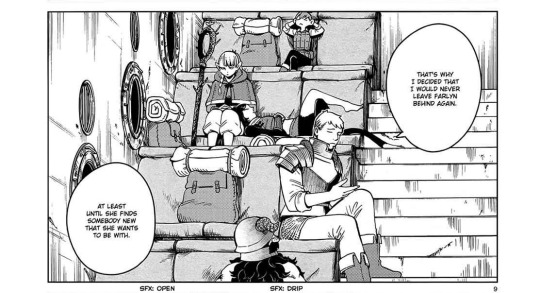
Herself. What if she wants to just be with herself for a while.
And this is me reaching but I feel like, not unlike Izutsumi who learns to feel this sense of never being alone, always having someone on your side what with having two souls, the dragon in her would make her consider herself more. She finds it easier to care after other people after all, and in the purgatory fields sequence she takes care to bring the bit of dragon left with her… Not unlike with Izutsumi, having two souls forces you to think about your identity and figure yourself out. Besides being this sort of duo now, where if she wants to care after herself she can channel it to that other side of her too… In meta dragons are symbols of greed, and I think the bit of dragon would push her to want more and listen more to her desires, primal and self-serving as they might be. The dragon soul which warped her human body with feathers and draconic features, her image of perfection marred, her weirdness externalized in a way that’s not palatable. But she doesn’t care, about if her appearance is palatable for most people, she hasn’t for a while now, and that’s great.
Notes & nuance
I’m struggling with the structure of this post, making my points organized, concise and strong at once. It’s difficult to make any statement without going "things are generally like this, but there’s this time that this contradicting thing happened too" or "it’s ambiguous enough that you should just follow my interpretation for the time of this analysis" haha, so this is the pit where I put all the stuff that wouldn’t fit well in other places but are interesting for Falin’s character. This section is pretty separate from the main thesis of the post, it’s just more Falin observations. The post has reached the 30 pics limit so I can’t just pull it up whenever it’s relevant but I really encourage scrolling up to read the stuff I highlighted in her Adventurer’s Bible profile if you haven’t already.
I think with the shy-looking loner type autistic kid archetype, and knowing she didn’t seem to mind others ostracizing her, it’s easy to lose sight of how she was by no means an unemotional child. In all the bits we see of her as a kid she’s bursting with energy and emotions. Canon confirms Laios leaving the village did affect her and make her lonely and she cried a lot, too. She may not be social in the traditional sense, but she was clingy with her brother, and she also never was all that shy about who she was, wearing her heart on her sleeve.And okay. Okay okay okay. Speaking of appearances. About what I said of her not caring about what people think of her, even seeming defiant with the caravan leader… There’s one istanxe of her caring actually, and it’s about how her face blushes easily. I remembered it as being because Laios’ said it and as I rambled Laios’ words are her world, but actually it’s ambiguous. It’s only Marcille imagining up this scenario where Laios says Falin looks weird because of it, there’s no evidence Laios said or thought that at any point. And on the other hand…
Her Adventurer’s Bible says: "5, Lovely Skin. She isn't particularly careful with it, but Falin's skin is fair and beautiful. Possibly as a result, her cheeks seem to flush easily. Marcille's always saying she's cute, and she secretly has a sizable complex about it." The phrasing makes me think the complex she has over her blushing might have developed because of Marcille more than Laios. "Marcille's always saying she's cute, and she secretly has a sizable complex about it." It could be related to how Marcille gets swept away and infantilizes her, calling her cute wanting her to wear cute feminine outfits etc. Again this feels like it relates to Falin’s struggle to be seen for who she is and what she wants to be seen as, her struggle to be recognized, having ideals and perspectives pushed onto her. Here Falin is insecure over her blushing implicitly because she doesn’t like being called cute over it, but that’s not how she wants people to see her. She doesn’t want Marcille to always see her as her 10 years old adorable friend. Like if your friend said you had puppy energy, it can be flattering, but it can also make you insecure.
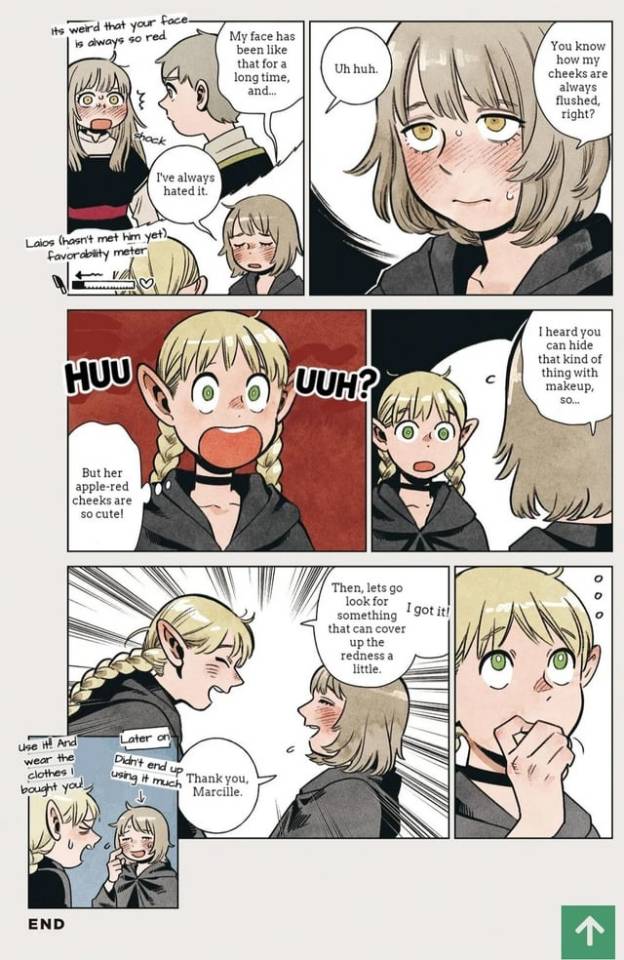
Here’s a link to what I mentioned about her being uncomfortable wearing feminine outfits. It does seem to be more about comfort than the aesthetic perse, to me. Interestingly the shirt & shorts don’t seem like they show much more skin than her beach outfit, so maybe it’s more about the shirt and shorts being tight-fitting. Like the skirts and heels they feel stifling. Again a bit with themes of freedom and not wanting an aesthetic pushed onto her. So yes just to reiterate, I think this is more about self-affirmation and how her identity and self-image gets shown to others, rather than wishing to hide parts of her body like her blushing etc for people pleasing reasons. Makeup was a way for her to appear how she wants to and feel more confident. It was a way to take control over her own image. She didn’t keep doing it, the narrator stating the process to be ‘troublesome’. Ultimately she still prioritizes her comfort, and it was a lot of recurring efforts to go through.
And on the topic of appearances… A friend once asked me: "Does she really hide herself or not? I keep thinking about "falin is herself first and foremost" (in her Adventurer’s Bible profile) it’s just so. Hmmmmmmmm... I just keep seeing people say she hides her real self from people when I feel like the issue is more about her charitable traits straying too far into becoming flaws but people around her dont realize that..."
Imo the thing is, I don’t think she hides her identity, but I do think she suppresses her individuality for others’ sakes if that makes sense. In the way that only post-canon does she allows herself to go see what the world is like, but that’s not personality wise it’s needs and wants wise. And I do feel like that’s the closest interpretation of canon, she says it herself she doesn’t know what she wants because everything she’s done was always about Laios or Marcille, but she doesn’t change her demeanor or personality for others. But she *will*, like, not ask for things she wants directly, like sharing lunches with Marcille at the academy, she suppresses her wants, doesn’t ask things from people and doesn’t hope for more, hope for better. I don’t think we ever see her actively repress her personality, except like what, being more laidback than enthusiastic but I do feel like unlike Laios with her it’s less ‘appearing stoic to fit in more’ and more ‘yeah i’ll just chill until I’m needed or something activates my enthusiasm’. To which said friend quoted: "to feel like you belong you need to be useful. when you can’t be useful the next best thing is being convenient."
And speaking of passivity… I want to speculate about Shuro’s proposal some more. Shuro and her got along well though we don’t know how much, or how often they hung out, she even saved him from a nightmare. Why did she take so long answering Shuro’s proposal? Was it an effort to preserve or was she really just that conflicted? Procrastination probably yes, but what is the core motivation of itl Considering she ended up saying no to travel the world instead, I don’t think it was as simple as ‘she wanted to say yes for convenience’. Logically it’s what would have been best, but it’s not what she wanted for herself, but it was and still is hard for her to even know what she wants. Probably, since like she states it was a great offer and she doesn’t think she’ll get proposed to again, it’s that self-effacing tendency that yes it’d be convenient and logical, and that makes her want to say yes even if her spirit isn’t in it, because if it’s convenient then that’s more important than her feelings on the matter. Man also… Obviously Marcille is very vocal about how she shouldn’t get with Shuro, but imagine how Falin’s whole perspective on marriage must have felt when her only friend ever is a Romantic with a capital R who gushes about idealized romances and grand gestures and True Love and doing things with fully pure feelings all the time.
AND speaking of passivity!!! How much Falin is "there" as the chimera, just how much she’s master of her actions, is left ambiguous and intentionally so imo, but she’s for sure there & influencing the dragon’s action to some degree. Having a dragon’s foot on her in purgatory that keeps her from moving for sure visualizes how it must have been like, but there’s Falin calling out to her brother Laios, there’s the kind attentions towards Thistle that are so Falin-like, and most explicitly there’s the Adventurer’s Bible stating "Even after becoming a chimera, she has a soul that's as kind as ever", which I honestly dislike, a fantranslation puts it as "Even as the chimera, her caring nature remains" and either way to me it feels like confirmation that it’s her giving those berries to Thistle. Now, wether or not she has the mental capacity of a chicken or something closer to human Falin, no clue, there has to at least be some kind of mind bond between monsters and the dungeon lord, compelling or forcing them to go along with orders, or calling her to him in distress like with the fight on the first floor. But yes, it’s interesting to wonder what it is that a Falin, with her kind soul but without her human mind, would willingly do. On her profile, she’s described as Thistle’s guardian and servant. The power dynamic between the two are very interesting, I already went into how it might have felt like freedom to her while being fake so I’ll reign myself in and just mention it again. She’s still at the heel of someone, only now it’s someone who doesn’t care about her back. Going from being cared for so strongly that it’s suffocating and they would defy death and the world for you, to being devoted to someone who has not one feeling about you besides your utility as a paw . She has all this care to give and to focus onto others and he has none to send back to her and I think that’s part of it. In a way, being left with only her own feelings and a void, without expectations or feelings or ideals pushed onto her, it might have been soothing in itself, and eye opening. But yes the way I think of it, her care for Thistle isn’t unlike the care she gives the ghosts.
Interestingly, the care she extends for the ghosts is sending their soul to a peaceful death, freeing them, of life and any earthly attachment. Take that as you will with the themes of freedom and burden of life and mind, immortality and becoming a warped version of who you were, and such and such.
But going back on the topic of connections and bonds for a bit, I think academy days Falin & Marcille is super interesting bc we’ve never really see Falin form a connection besides with Marcille and even that is kept pretty ambiguous. When was the point that Falin started seeing Marcille as a friend and seeking her out? When was the "I’ll lay down my life for you" point? I’m so fascinated by how she wanted to share lunches with Marcille but never truly asked, only made little "hey want this? I found it isn’t it cool?" gestures of showing things to her… It’s the only way she knows to ask, or maybe it’s the only way she feels comfortable to. In all the scenes of young Falin and Marcille Falin seems comfortable in her friendship with Marcille, but at the same time… I think we see Falin at her most insecure around Marcille, because she really does care about Marcille and what she thinks of her so much, and while Marcille is a bit of an unstoppable force tornado style (affectionate) Falin is something of a doormat. I’d usually say showing her berries was her earnest way to connect and be like "Hey bestie look at this! :]" , but there’s a real possibility that she was self-conscious and holding herself back.
Friendship and Marcille! Involving Laios into this too but, again with the autism thing of not showing you care in ways that others understand, Marcille being very overtly affectionate and clingy was so so soo important… Marcille keeping on hanging out with Falin and caring after her, and being undeterred/unbothered by Falin not always seeming like she cares all that much back in the conventional way, as in Falin acts nonchalant and a bit like she didn’t mind wether she was there with her or not during her outings to the cave dungeon. Caring and being clingy and so affectionate despite that in such a classic Marcille way is soo needed, because so often people will get discouraged by say, their friend not keeping in contact regularly/well, seeming disaffected or as happy-go-lucky as ever even if you haven’t seen each other in a while or when they’re alone, and yes there’s potential for a strong friendship there but someone like Falin won’t be committed enough to reciprocating attention the same way… I hope I’m making sense but yes this angle in particular strongly correlates to autism. And the way Marcille always initiates physical affection, both Toudens being awkward about initiating touch because they don’t know if that’s allowed, if they’re going about the social interaction the right way, if they’re allowed to ask that out of someone…
Another fun observation to make is about the 4 years Falin and Marcille spent apart. Marcille despite being of a long-lived race treated these 4 years of separation with more gravity than Falin did. Falin brushed it off very dismissively to say the least. But then you remember that the amount of time Falin and Laios didn’t see each other after he left the village was 8 years. Double the years, double the time. And that reminder makes Falin’s actions so starkingly understandable. Of course she wouldn’t see 4 years of separation as a long time if 8 years of separation with her beloved brother is her point of comparison. Of course she’d see it as worth it to leave Marcille for 4 years if it meant ending those 8 years instead, especially if she was worried about him (the reason why she followed him into his caravan job).
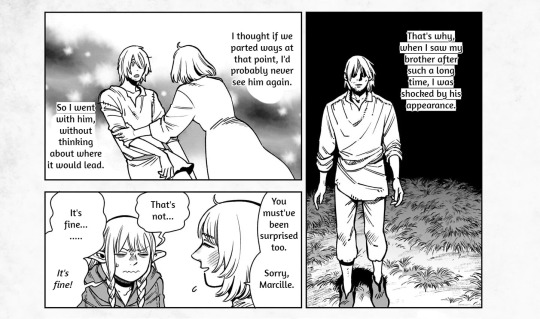
A friend always says that while Falin is the center of Marcille’s world, Laios’ is at the center of Falin’s, and I tend to agree.
It’s fun to think of how her career dreams had always been shaped by Laios, even when they were kids. Of course there’s how traveling the world began as a dream they talked about and shared, but there’s how he reassures her by listing cool jobs she could do like traveling exorcist, etc. And then of course, she gave up on her magic academy and career path to follow him and do odd jobs, etc etc.
I should go into the violence of Faligon more tbh, because I think there’s an interesting parallel to how she has no problem wacking things with a mace, wether a ghost when she was a kid or a walking mushroom as an adult. Something that often surprises fans when they remember, I don’t really want to get into the whole " Falin hates violence and hates seeing people in pain to an intense degree. ‘If you die do it somewhere where I can’t see’ style’ interpretation, it has some weight but on the whole I don’t vibe with the theory she has a particular aversion to violence, she seems to be fine resorting to it as much as any other adventurer as long as it isn’t needlessly against ghosts. And Falin’s sudden mace hits are fun to me too because it’s not her becoming a berserker when the need arises as much as her becoming active because something she cares about is threatened, and that brings her out of her passivity from 99% of the rest of the time. Thistle included. Falin always could be violent, she just dislikes senseless carnage. The Shuro party vs chimera fight is a bit ambiguous on it, because you can argue she only attached after being provoked, presumably offscreen as well while the ninjas went off to fight the harpies. Falin becomes the most active when she needs to protect someone, she has no qualms doing whatever’s needed for that, wether it be leaving the academy & Marcille without notice no matter the consequences or what her parents think, or teleporting the party, etc.
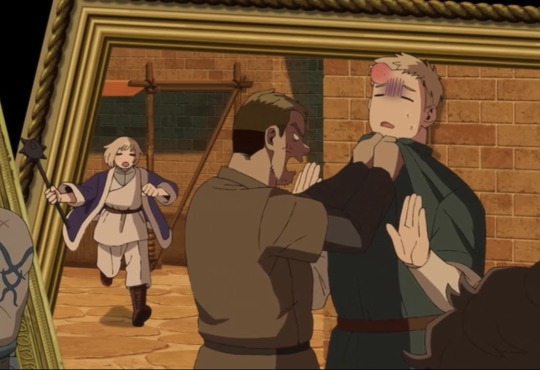
I’m working on a post specifically pointing out all the differences between Falin and Laios, but yes I think both of them selfishly desire freedom in different yet similar ways. Falin’s dark secret is "Ethics and risks are optional if it means I can protect those I love" like the teleportation, and Laios’ is "Ethics and risks are optional if I can be free of all this bullshit" aka humanity aka his wish with the winged lion.
Conclusion
Flighted birds have hollow bones. With freedom and wings there comes risks and sacrifices.
Tldr: Falin doesn’t care all that much, she’s very go with the flow. For example if someone hates her she doesn’t really care because that’d require her caring about what they think of her in the first place, and she only cares about her loved ones. She smiles, but it’s more a state of being rather than out of active goodness: she’s canonically very genuinely kind, but it’s more out of a general want for pleasantness than active care itself. She’s passive, and softspoken because that’s just how she seems, but she has no problem hopping into bushes or getting heated if something calls to her enthusiasm or calls for action and a hit of the ol’ mace. Her loved ones needing tending or protective is what makes her go from passive to active. That familiar autopilot mode of making someone the center of her world and following their every move is what made her so easy to be controlled as the chimera, even ferociously defending him with her life. Faligon is most interesting to me with the theme of freedom. She’s shackled to Thistle and out of her mind, but there’s also a sense of empowerment and freedom from expectations and society. She spends all her time caring for Laios and Marcille alternating that none of her care and emotional energy is left for others, including herself. So she had to get relieved of all of that for a bit, becoming the chimera so she could reset and recenter and remember that she, too, indeed, is there and an important part of her own life. There’s a way of caring after others that can be selfish, not unlike Marcille being overly coddling and not listening to Falin. In Falin’s case, I think it was so selfless that it ended up looping back around to erasing her sense of self. In losing sight of herself, that devotion becoming neither quite selfish or selfless but a fact of life and a state of nature, muddled by its lack of direction.
She’s sooo used to never being able to ask things out of others, you get the crumbs of affection and approval that others offer to you unprompted and that’s it don’t hope for more don’t ask for more. (Also reflected in how she follows her loved ones around without complain or personal opinions and how she’s not willing to rock the boat and affirm herself in her relationships like with Marcille during canon)
Falin cares so much, so much and so laser focused on her few loved ones that it blinds her and she loses sight of everything else, she ends up neglecting herself and the rest of the world. As Kui puts it, Falin is herself first and foremost. She just had to remember the importance of that.
-
I see her as an enneagram 9, which can be surprisingly accurate and fun to research through the lense of Falin. Excerpt below from this book, but like my god, good way to put it
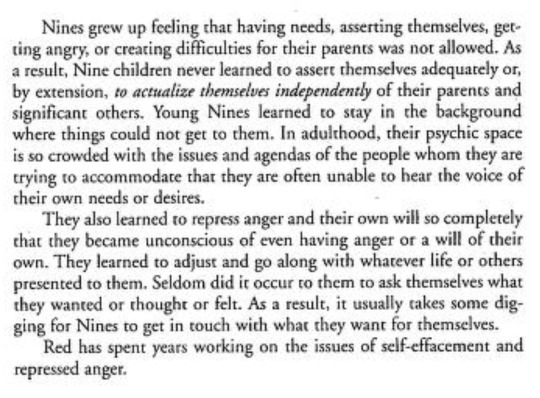
That’s it, ty for reading. Even if it’s a bit of a mess, hopefully you’ll have gained a thing or two from it. Falin is a character hard to pin down, but it is very gratifying when you find the way that the puzzle pieces fit together right for your own understanding of the story. Fantranslation of the shuro proposal comic by @/thatsmimi here.
Here’s my spotify playlist for her if you’d like
Sometimes love is about letting go, a lesson a lot of the cast needed to learn. Self-love’s important too, and just like with diets we need a healthy balance.
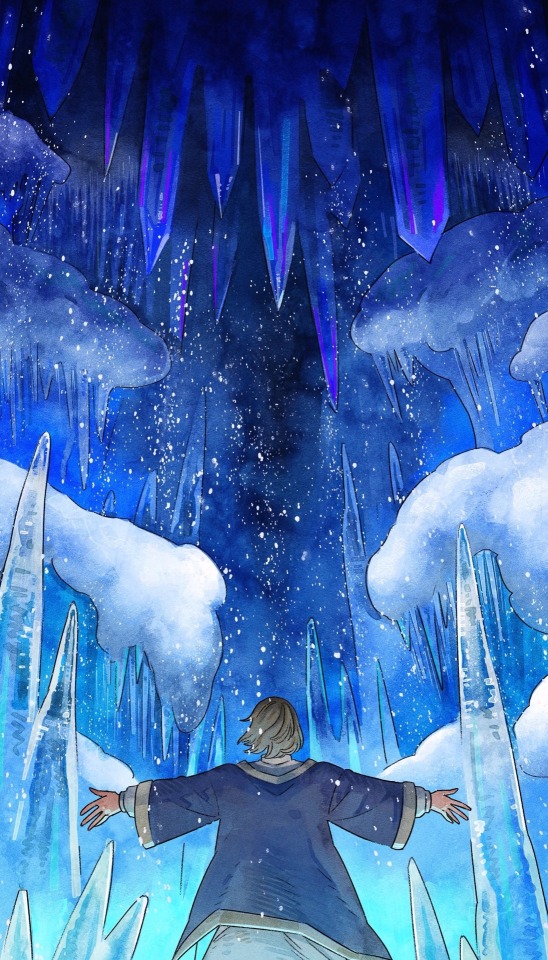
#I find it hard to express myself right on the topic of Falin. Both because the issue is pretty vibe based and because we don’t#get that many moments with her. So there’s ambiguous scenes up to interpretation addressing a layered topic and like. Save me. Save me#As always falling down the rabbithole of starting an analysis about a specific facet and then needing to explain everything else around it#I’m doomed. I’m getting lost in the sauce.#dungeon meshi#delicious in dungeon#falin touden#analysis#character analysis#meta#autistic reading#aroace reading as well. Sort of. It’s mentioned#The aroace autistic guilt of not caring back in the way/with the intensity you’re expected to#As always this is just my interpretation blablabla#Spoilers#dungeon meshi manga spoilers#She loves like a dog aka unconditionally and happy with eating scraps of affection and attention off the floor#Laios touden#he’s here too bc they are an unit#If you’re not capitalizing on the uncanny vibe autistic effect for Falin’s character u are missing an opportunity imo#Fairy’s child is written all over her. Her cryptic-ness is the point so why am I surprised she’s hard to fully pin down#Even with the graveyard scene it was Falin following Laios… Sob. Laios could feel responsible her powers were found out#I’d like to rework this at some point if i get better at structuring. I’m not satisfied by the level of clarity#Will 90% for sure edit stuff in if i find more to say.#Fumi rambles#Crazy style#I give a TLDR at the end if you’d prefer. It doesn’t have the like evidence/explanations alongside but it makes the main points i think
1K notes
·
View notes
Text
Ohhh, I'm rereading Mystra's entry in the Sword Coast Adventurer's Guide... and this detail:

This means Gale was punished for trying to restore and preserve what he thought was a lost piece of Mystra's magic. Gale being Mystra's ex-lover put aside. He as her follower, she his goddess, was punished for attempting to do the one foundational rule of her faith.
I'm seething and so sad at the same time.
Edit: I used the word punish loosely, as in, toxic/abusive people will take any small mistake or action and twist it into something they can take advantage of. This post was also largely from the stand point of a toxic deity rather than a toxic partner, but both takes are valid here. Especially with the, “you didn’t stay compliant so now I’m giving you the silent treatment” part of it—from a god and a partner perspective.
#bg3 spoilers#rambles#bg3#bg3 gale#gale bg3#gale dekarios#gale of waterdeep#gale baldurs gate 3#baldurs gate gale#baldur's gate 3#baldurs gate 3#baldurs gate#I understand different versions of Mystra exist#but the bg3 version of her makes me seethe#all the time#TAGS PAST HERE ARE UPDATES#this post was most about comments on the religious trauma aspect#character flaws make character great so I know Gale isn’t perfect#but yeah I do read Mystra as a groomer with the comments minsc gave#like I hate her as a person#her character contribution makes the story interesting but I just objectively can’t excuse anything she does#she makes me feel enraged because they literally had to hide weave gifted boys from her#hello??? I’m sorry but you can’t make me like her or excuse her treatment towards gale after that knowledge#sorry I’m getting heated but goodness I have to say it or it’s going to make me implode
1K notes
·
View notes
Text
I’m a simple soul
I see a hot blooded trauma fueled man with an ego and daddy issues become an unwilling single mother who then steps up after multiple trials and errors to grow into a proper parent that fights tooth and nail for his daughter AND face said daddy issues head on for the betterment of his child thus reconciling and healing his own relationship with his father and bringing an enthusiastic grandpa into the mix
and I crumble
#Kenji Sato#Ken Sato#Ultraman: Rising#Ultraman#KENJI SATO THE MAN THAT YOU ARE AND BECOME!!!!!!! BECAUSE OF HIS PARENTS!!!! AND HIS OWNS STRUGGLES AS A FATHER!!!! FPR HIS DAUGHTER!!!!!!!#ULTRAMAN RISING IS SO SO SO SO SO GOOD Y’ALL GO WATCH IT JUST DO IT!!!!!#IF THE MOVIE HAS ENOUGH HYPE THEY’LL DO A SECOND AND THIRD PLEASE PLEASE PLEASE WATCH IT#God I have so much to say about this movie and everything about because it’s such a beautiful film both visually and story wise and I love#the themes and characters deadass all of them were entertaining and fascinating in their own ways!!!#I’m planning to watch it later with my family I want them to see it it’ll be so much fun!!!#Ani Rambles#Happy Fathers Day folks!!!
963 notes
·
View notes
Note
May I ask what were the best transformers media you ever saw/read?
Well Transformers Prime, Transformers 1986 and IDW comics are having the first place that’s for sure
And then the second place is kind of shared by Fall of Cybertron, Exodus, Prime wars trilogy, Robots in disguise(2001) and Transformers One.
The third place goes to G1, Animated, Earthspark, Armada, War for Cybertron Netflix series, Aligned Robots in disguise, Bumblebee, Rise of the Beasts and Cyberverse because I only liked some little parts of them.
And then I also saw some of the Bay movies, Victory and Headmasters and didn’t like them at all.
Separate first place for J-Decker. It is not exactly Transformers but it is a show about giant robots and I loved it
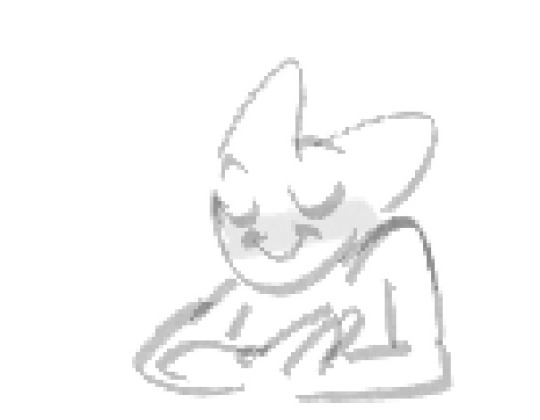
#call me weird for placing cheap ugly shows above Earthspark and Animated#but the thing is#I have when the whole narrative revolves around human kids#*hate#I’m allergic to them#Prime wars trilogy had one of the worst face rigs I ever saw#but it also had Overlord teaming up with evil Rodimus and Megatron being funniest mf alive#Armada is straight up infuriating imma be honest#Armada is like#Au where all the weapons work only once and then just create some glitter#I actually have SO many thoughts on Armada. like. as a writer#the way they keep reusing the same plot 3000 times is borderline impressive#OH War for Cybertron from Netflix was such an experience!#It was so painfully boring and stupid sometimes#but the other times. ooooouuufff. The scene where some nameless decepticon gives Megatron a little tour to show him how him and his friends#-work so hard for the cause??? THAT SHIT HIT HARD#….also I pretty much only like the Quintesson apocalypse arc from the entire Cyberverse#Transformers Victory is fun until you actually hear them speaking#the concept of Star Saber adopting a human child and raising him and then#going to human school as his legal guardian being like ‘yeah sure I can sign all your tiny ass documents’#it’s hilarious but unfortunately all the writers of that anime were snorting cocaine because WHY all the characters talk like that#Animated was fun for me only near the end. Idk what to say. I’m not a fan of any drama centered around humans#things got interesting when Cybertronian government got involved#Earthspark is WHOLE giant topic ahahah. I liked Twitch. sometimes. I also liked Grimlock while he had voice lines. Prowl was fun.#everything else needs and essay haha I don’t wanna annoy anyone#OH I also watching Tf Cybertron right now and this shit is UGLY. they have NO RIGS. THEY HAVE ONE EXPRESSION EACH#but for some fucked up reason I love it. they got the guy named Landmine who only can have (-_-) face.#their Megatron actually respects Starscream so far and regularly gives him positive reinforcement??? I heard words ‘excellent job Starscrea#and went WAIT WHAT#Anyway. If you ask me to ramble about media you get a word tsunami. I have a lot to share
274 notes
·
View notes
Text
in case you are in the mood to feel devastated here’s an alternate way of viewing charles’ response to edwin’s confession:
we know that charles kinda puts edwin on a pedestal- yes they are partners but there is a bit of a hierarchy between them. charles just looks up to and admires edwin in so many ways while constantly looking down on and being really hard on himself. he puts on his big happy persona because he thinks that people wouldn’t like him if they actually got to know him.
so when edwin confesses, it’s like a blow to him. he took his charming persona too far and went and tricked the most important person in the world into thinking he was worthy of love. and it’s worse because he does love edwin in that way, which is exactly why he can’t let him know that. charles still believes that he is like his dad, and he saw exactly what his parents’ relationship did to his mother.
he thinks that loving edwin in the way that he wants to would only cause more pain to this boy who has already been through far more than he deserves. so he blinks back his tears, attempts the same charming smile he’s used all these years, and dishes out the gentlest non-rejection in the history of forever
#i don’t really think this is what happened but my brain just loves to add an extra sprinkle of angst to everything#but honestly the more that i study that scene the more i think this is a possibility#at least to some extent#like specifically his facial reactions after edwin says he’s in love with him#he looks panicked and devastated#almost like it was something he thought about before and was afraid of it happening#and then he cracks his little joke to downplay it because he isn’t ready to accept that what’s really happening#because he already had to watch edwin get dragged away before he could step in to protect him and now this#his two worst nightmares became reality in hell#anyways i do think he’s just oblivious and will figure it out in season 2#but i just wanted to ramble#i do think a lot of the reason why he has to figure things out is because he’s afraid he’s a bad person#so it’s more him figuring out if he’s good enough to love edwin rather than if he actually does#okay i’m done yapping for now#dead boy detectives#payneland#charles rowland
354 notes
·
View notes
Text
Just a reminder that people can write whatever they like! If you don’t like it don’t read it! It’s so simple. It doesn’t matter if you think it’s bad. It’s fanFICTION. Which people do for free. If you don’t like it don’t interact. You can ever block or mute them!! But that doesn’t mean it’s wrong. As long as they’re tagged correctly they’re giving you the tag you need to decide if you don’t want to read it.
#listen I don’t like bashing fics either.. but that doesn’t mean that people are wrong for writing it#ESPECIALLY if it’s tagged correctly#they’re warning you that there’s bashing in the fic so you don’t read it!!#that’s the whole point!#sure you’re allowed to be upset that this is happening but you can never say people are wrong for doing it#because it’s fanfiction and they can create their own experience JUST AS YOU CAN TOO#I’m not here to start anything I’m just here to remind you all that it’s fictional and especially when it’s all tagged it’s all fine!#the more you get hung up on what fic is out there the more upset you’re gonna be#CURATE your experience just as others do for themselves#please!! you’re just birthing a fandom divide#there’s no right and wrong in fanfic#idk how else to say this#once again you’re allowed to not like something but just don’t interact!!#911 abc#911 fandom#purple rambles
130 notes
·
View notes
Text
my favourite thing is naming new documents when you PROMISED you wouldn’t start any new projects



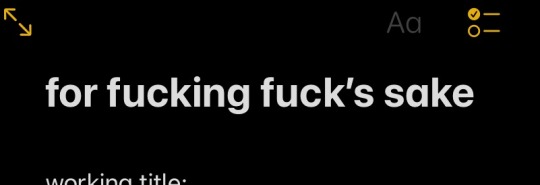

#ramble#fun fact the last one is for after party#didn’t bother naming it because i was SO sure i wasn’t going to commit#and here we are#i want to say 70% of my stuff happens when i say ‘i’m not going to start anything new’
592 notes
·
View notes
Text
steve blackman, when you were deciding that it was crucial for five to have a fucking romance plotline with his brother’s wife did you also find it crucial for five and said brother to have several sweet heart-to-heart moments throughout the season just to lead to them dying with a deep hatred for each other
#NO resolution#NO understanding#NO talking about it#it was literally hey we’re best bros! thanks for being there for me man#to did you sleep with my wife?#to i wanna fucking kill him#to death. to nonexistence. to erasure of history actually#i literally hate the writers so much because even if it was just going to be a stupid little plot for five and lila to get together#why the HELL did you have to write scenes where five and diego were being sweet brothers to each other#why the HELL did you write wholesome bonding scenes when you KNEW that you would end the fucking show with them trying to kill each other?#my god#i’m rewatching season 4 and i’m PISSED off#… again#opening old wounds rn#five x anyone but fucking lila#tua s4 spoilers#laur rambles#laur says stuff#the umbrella academy#tua#umbrella academy#five hargreeves#tua s4#hargreeves siblings#tua season 4#number five#tua five#anti five x lila#anti fivela#anti steve blackman
129 notes
·
View notes
Text

i can't get enough of them
#river dipping#theodore doe#matthias evanoff#a burning house to live in#echthroi#ts4#ts4 screenshots#have been toiling away at an edit i’ve been meaning to make for months now which Is! giving me psychic damage#and i haven’t logged in in a few days so. shares this screenshot with you 🤲#i have so many random screenshots of them that i could share honestly i’ve been playing the game so much lately#but yeah. this edit i’ve been working on… legitimately can’t even start it because it upsets me every time i stare too long at it#i’m simultaneously putting it off while also being a perfectionist and nitpicking every detail#but anyway. it’s a nice change of pace to look at mattodore being sweet and beautiful instead#i’ve decided matthias is keeping the dimples btw 🙂↔️#also i love their alpha versions so bad i’m just completely ignoring the transparency issues w the hair and my preset#so don’t look at the obv outline of their bald heads#me saying hi i’m alive! look at my ocs! and then turning around and staring in harrowing grayscale at procreate#logging back out .#oh but wait.#beloved anon who sent a message abt matthias crying over theo know this: hehe yayyyyyy#and also i will reply eventually .#the abandoned state of my inbox…. let’s not discuss it.#sawrry . with big wet eyes#i will be capable of saying things about them eventually#i simply can’t form the sentences rn#<- but can ramble in tags foreverrr#hashtag tumblrgirl
118 notes
·
View notes
Text
*clap hand and sigh* Look I should not be up at this hour (I was up at 5 am writing this) or posting since I don’t want to accidentally get myself shadowbanned or whatnot (I do have another good omens post coming up regarding metatron so stay tone for that). But I saw like some post regarding how Aziraphale doesn’t love Crowley as much/Azirpahale never did anything for Crowley. And it been wracking my brain because, did we not watch the same show? (I would say book but I’m still reading it)
Look before i continue, I do think we all have opinions, that’s valid. I just want to say my two cent since I can’t find myself agree with those claims.
But imma give Crowley his flowers because this soft demonic husband deserve it, yes, he done stuff for Aziraphale. Some that can risk him getting destroyed by hell such as saving the literal angel of eastern gate. He’s take him out for lunch, help him whenever Aziraphale ask him too. If there was a way to describe the love language “act of service” that’s Crowley to the absolute T. So I don’t think we can deny that fact about him, but Crowley would absolutely disagree with the fact that Azirpahale has done nothing for him consider the fact that there evidence and implication that Aziraphale done stuff for him.
In episode 3 of season 1, during the Shakespearean era segment, it was said that they do each other blessing and temptations since as Crowley stated “they don’t care how it done as long as they can cross it off the list” so who know how many temptation/blessing Crowley and Aziraphale did for each other, (lowkey I would love to see how Aziraphale does temptation, i miss this part as I’m rewatching GO for the metatron post coming up I don’t know how I missed that part but now that I discover this, make me think). The point is, this is one of many indication that Aziraphale does help Crowley.
Same episode, Holy Water, now this is the prime indication that I think we can all agree (or not, I’m just a phantom writing this blog). Now, before, can we see just how Aziraphale didn’t say “oh I can’t give this to you because I’ll get in trouble” no he said “it will destroy you”; that show just how he cares about Crowley, he doesn’t care about his job or that he was breaking the rules no no his main concern was Crowley. Sure he did after words when mention “fraternizing” (which honestly Crowley, me too I would be mad too if fraternize was used. But I can understand why Aziraphale said that as well.) but Crowley put Aziraphale in a difficult position, because while sure maybe Aziraphale could give him holy water but that would be not only breaking protocol but also giving him worry because given this happen after Elspeth episode, of course his mind will be concern of this whole thing. Especially with him saying “if anything goes pear-shaped”. And you know in 1967, he does give it to him overall, regardless of what he said. Because at least imo, he learn that he has to trust him. Just like how Crowley trusted him in 1941 with the magic show (remember this.) he trusting him here.
Okay now this is mostly all of season 1/2 before I mention what he’ve done for Crowley in season 2. The fact that Aziraphale help Crowley try to stop armageddon. Now you might be saying one or two things “Phantom, he back out in episode 3” or even “um, but it was mutual?” And you know you’re right on both those points. He did back out and it was mutual, but it still an example of doing something for Crowley. Why? Because they both love earth, they would do anything to preserve earth. Not only that, they can’t bare the idea of having to fight each other in this celestial war let alone the idea of one of them getting hurt. So they would not have gone through with this end of the world stick if it mean that they lost everything, now Crowley did agree with armageddon on general terms as God said in episode 1, season 1. BUT, actually doing it and going through with it is a different playing field and Crowley nor Aziraphale don’t want to lose everything they love (especially each other). Now it did take a lot of convincing, most because Azirpahale want to stop it more than Crowley but there one thing that is holding him back or make him scared to go against them: Heaven.
It kinda like an analogy where, say, you’re getting bullied or say that you’re dealing with an toxic family member, boss, whoever. And you yourself know they’re toxic, and you have people who can tell you “stand up to them” or “don’t let them get to you, tell them off”. And you can agree and try to build courage. But actually doing it is as the famous saying goes “easier said then done”, and Aziraphale would rather just put a fake smile and try to make everything look good so that he doesn’t get reprimanded by heaven, he doesn’t have Crowley’s confidence which I have this feeling most people forget about. Sure, Aziraphale have all rights to tell them off after the shit we the audience see or hear them do to him, or what Aziraphale had to allow happen, such as the flood for example or witnessing the crucifixion of Jesus Christ or even the fact that they almost killed him with hellfire, just because he wanted to save the universe. (Also the fact that it might have been implied that they drill into his head that if he ever does anything against God’s “plan”, he will fall like Lucifer or any of the other angels). But he can’t. Which is why he back out at first, because he was terrified that he would get in trouble or fall. (Which. Without saying much, I kinda would’ve done the same in fear.) and you can see it in his eyes, that he want more than anything to run away, yet, he still trying to push it down. Bottle it up if you will as his effort to try to back out. Now of course as we all saw how season one ended, he did ended up saving the world after all and I think Aziraphale and Crowley would do it again so they can be on their own side. So Aziraphale did hold his end of the bargain when it came to saving the world which is why I’m including this in my argument because yes this is mutual, Aziraphale still pull through with not just the help of Crowley but with Agnes Nutter’s book and Adam himself.
Now imma go with season 2, which is “season of love” as Rent would say.
Now, we love it, we cried about it, or we want to rip metatron a new asshole (which imma just say, I have never seen a fandom have this much togetherness of hating a character since GOT with Joffrey. But I’m all in, I hate him in season 1, season 2 just made me hate him more. But I will say, Derek Jacobi is doing a phenomenal as him and I can’t wait to see what season 3 will have with Metatron.) but I digress, let continue this rant.
Episode 2, season 2, is the episode that solidified many things for me. But let get to the point, Aziraphale could’ve stop Crowley from “killing everything job worked hard for” but he was gonna let him do it because Heaven said “oh yeah we decided to make this poor man lose everything because we wanted to win a bet with Satan.” But seeing how Crowley didn’t actually kill the goats, made Aziraphale happy, and in a sense began trusting Crowley’s process here. Even when Crowley set the house on fire and turn the kids into gecko, he still trusted him. And sure enough, everything work out at the end as Aziraphale help him through this plan on giving Job back his kids (even though heaven was gonna make job’s wife give birth to seven more kids. Which my crotch hurts from hearing that-). Sure Azirpahale had doubts and had a breakdown, but given as I mention earlier and how he’s the only angel (maybe besides Muriel) that have a conscience and broke a rule by giving away the sword, he have conflicting views but also is trying not to have a conscience to fit in with the angels and follow their lead despite he was never seen as an equal. But this still is example never the less as if Aziraphale didn’t do something thing would’ve ended different.
Now imma get to the one that is probably another prime example of Aziraphale doing something for Crowley, is the magic show (or at last the minisode in episode 4). After Crowley saved Aziraphale, he had to go to deliver something for the black market, and seeing his item was destroyed (most likely from the bomb), he got reprimanded by Mrs Henderson. And on Crowley’s behalf, Aziraphale decided to volunteer as a magician. He even bought the gun to do a show stopping trick so that it can impress her and not reprimand Crowley any longer (but of course just an excuse to do magic, which me too. I love magic). Now Crowley did have his concerns especially with the gun and also that Aziraphale never done this in front of many people. But this episode, they both have to trust each other, Crowley with the magic trick and Aziraphale trusting Crowley with not just the gun but he trust that he would never hurt him.
Now I’m sure I’m forgetting more with season two (mostly because i still rewatching it starting from season 1, so let me know if you think there were other example of Azirpahale doing stuff for Crowley. Whether it was from season 1/2.)
But I think also the other thing is that, they actively protect each other from their side, they keep their friendship a secret. They swap bodies to not get burn by holy water/hellfire. And much more, so I dislike it when people think Aziraphale done nothing for Crowley when he ultimately have. Sure it seem Crowley does stuff more for aziraphale, but we can’t pretend like he didn’t do anything at all and I’m pretty sure he would done more for him if it wasn’t for heaven constantly being in the way.
As for the love point, imma say this, people show love differently. Why do you think we have so many ship dynamic and it usually two with either similar/opposite contrasting with the other love interest. Aziraphale show love in a different way, now I’ve seen people say that aziraphale love language would be physical touch, which, I think make sense considering he did held Crowley’s hand and we’ve all seen the amount of time he touched Crowley. However what if I told you his love language was Quality time? Because, Aziraphale usually talk about “oh why not have a picnic” or whenever Crowley offers lunch, he lights up. Or of course when Aziraphale tries to convince Crowley to use the Bentley he said “just like how that bookshop is technically mine but we get quite a use of it.” Or perhaps, whenever they’re with each other; Aziraphale have a smile. (Even when sometimes he tries to hide it, I love smiles). He can’t go a day without Crowley despite that they always been separate from each decade but I have my feelings that whenever they separate, Aziraphale feel a bit lost without him, not to say he doesn’t have other things but we all miss your best friend/crush/soulmate/etc, and Crowley most definitely does too. (Also who want to bet that most of the diary entry involve Crowley if not just an entire entry is like “dear diary, did you know Crowley’s yellow eyes are my favorite aspect and that’s why I love the color yellow-“ but I’m detailing here my bad.)
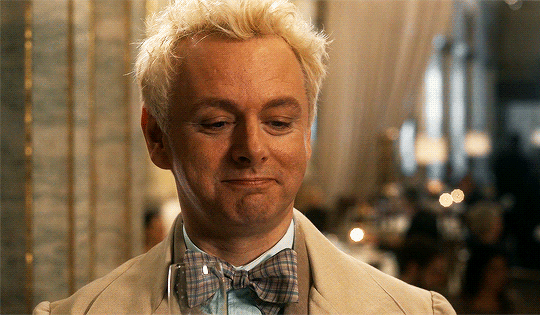
But another thing is that, I feel people who say that, don’t understand what it like having to hide yourself but have someone or something drilling to your head and is constantly reminding you that “you can’t love them because xyz” or most noteworthy, don’t know how toxic environment expect an individual. Because Aziraphale does love him he would do anything to be with Crowley, but heaven is not only what is ultimately holding him back, it him himself. He got this promotion and he toke it, (with the mention that he didn’t want to go until Crowley was brought into the picture) and now he knows that the second coming is well. Coming. And now he has to try to save earth, just without Crowley this time. Now why I’m bringing this up? Well, because you can see him once again pushing away any part of him that is telling him to go to Crowley or be by his side, it the same thing as episode 3 when he did tried to back out because of heaven, it the same thing here only heaven really got to him, heaven showed an inch (and I mean an little inch) of kindness and a promising deal and he was on board. But that cause him to “lose” Crowley (and I’m saying lose in quotation because I don’t think he really lose or that this is a divorce, I just more or less think Crowley just can’t trust Aziraphale this time with this plan and pull his support of the table). So now he have to revert back to his old ways to try to make sure the world won’t end again for not just humanity but for Crowley as well, and this is probably another example of Aziraphale doing something for Crowley and show that he love him, even if this decision caused him Crowley ultimately. I’m sure he wishes whenever he read a Jane Austen or any love stories (with happy endings.) that that can be Crowley and him; no worries, no heaven and hell, nothing. Just them basking in their love and have no worries. But he know that might not be achievable. (Oh how cruel Cupid/God can be.)
I going to reiterate this again, everyone have their own valid opinion regarding this. I just needed to get my two cent since I hate when people think they’re toxic when they’re not. Both and yes I do mean Aziraphale and Crowley, do have their flaws that need mending but no way they’re toxic by any means. Truly if they were this toxic, why would Michael sheen be liking ineffable husband fanart, why would Neil Gaiman say it a love story between them, or better yet, why would these two be friends if they were toxic? Do they have flaws that need working on? yes of course no relationship is 100% perfect. Will Crowley forgive him so easily? No, I wouldn’t think so, I’m not saying Aziraphale is wrong with what he choose but the fact that he didn’t take him or the bookshop into consideration that gonna take some time to heal. (I promise I’ll make a Crowley post, I do love Crowley too, it just Azirpahale my all time favorite and I kin this character. But I promise someday I will give best boy his time to shine I just need to find a topic for him.)
Okay, i think that’s the post for today, OH! And also happy spooky season! It about to be Halloween! I love halloween! So I hope you all have a good October, and don’t worry more post will come I’m just trying to make sure I don’t accidentally shadowban myself or be annoying with my post lmao. But tell me what you think? Do you agree? Disagree? Let me know ^^ all your options,questions, and statements are valid ❤️
#good omens#aziraphale#crowley#ineffable husbands#good omens 2#good omens fandom#i’m rambling because i say so#aziracrow#this show is my bread and butter and i eat it up everytime#I love this show 😭
28 notes
·
View notes
Text
Daily reminder that in 1980, only 36% of eligible voters between ages 18-20 and 43% of eligible voters between ages 21-24 voted. In 1984, 37% for 18-20 and 44% for 21-24.
Meanwhile, in 1980, 65% of eligible voters aged 65+ voted. In 1984, 68% voted.
Republicans have a history of relying on young voters to not vote. They purposefully make young people feel discouraged; like no matter what, it won’t make a difference.
I don’t care if your state tends to always vote with one party. Get out and vote.
Especially in swing states, every single vote matters. Every. Single. Vote.
Mail in your vote. Go during your lunch break. Plan to take the day off. Your vote matters. In fact, it matters so much that people will purposefully try to sabotage you voting.
Here’s a guide on how to register to vote and how to check if you are registered. Plan ahead. Make sure you know how to mail in your vote or where voting booths will be.
Republicans have been so flippant towards Gen Z because of our historical hesitance to vote.
We have the power to make things at least somewhat okay.
I have seen so many people from Gen z saying voting for Kamala is hopeless because she’s a woman of color, citing past elections as proof.
That discouragement is purposeful. It’s been used for decades. And it’s been working.
This website is relatively young. Especially with a lot of older Gen z, including me, where this is their first or second election that they are eligible for.
Don’t listen to those saying voting is pointless. That there is no way Kamala will win so who cares? It’s absolutely okay to be frustrated and or wary, but don’t let that keep you from taking action.
Young voters are the key. Start planning on your vote now. Take it seriously. Your voice matters. Your vote matters.
#I’ve mentioned a lot I’m a history major with a big interests in 20th century#when it comes to late 20th century I’m very into us politics#and I have said so many times that people need to study history because it becomes so obvious so fast how much history repeats itself#reagan bought out older voters and discouraged young people from voting and it worked#and it continues to work till this day#and it’s so frustrating to watch#not to make another two notes pity post but I just need to say it#2024 elections#us politics#rae’s rambles#joe biden#kamala harris
223 notes
·
View notes
Text
The TTPD Deep Dive (Part ?)
It’s no secret that I have a lot of Thoughts about The Tortured Poets Department and it has lived rent-free in my head since it came out earlier this year. I’m absolutely blown away by how underneath the chaos, it’s actually an exceptionally cohesive story and is probably the closest to a concept album Taylor has ever done.
There are so many themes that have stood out to me over the last five months, and there’s one in particular that I think not only drives the entire album, but ties into previous albums to help deepen understanding of it.
This is it, my fangirl magnum opus, my months of posts consolidated into one place. This is also my disclaimer that this is just my interpretation of the album, and my summary of the story it tells, and I don’t pretend to have any special insight or authority. I’m not saying I’m correct at all, do not take any of this as fact, it’s just what it sounds like to me, and these are my silly not-so-little thoughts about it.
(Under a cut because it’s way too long and involves discussion many may not care for or be sick of.)
Come one, come all, it's happening again (I'm thinking too hard about Taylor music)
The overarching theme in TTPD to me is: Grief. If you’re looking at TTPD as a story being told (instead of just as someone’s real life), the inciting incident of TTPD is loss, and the grief from that loss is what drives the narrator’s actions and the fallout, as well as unpacks those complicated feelings and how they apply to the her life in general. By the end of the standard album, it’s also about recovering from that pain, moving on from it and learning from it.
The loss specifically is the loss of the dream of having a family (with one’s partner). One thing that is abundantly clear both on the top line and under the surface in TTPD is how Taylor (as a person and as narrator) longed not only to for marriage but specifically parenthood, and the fear and then realization of losing that chance absolutely wrecked her— which is why the next lover’s (the conman's) wooing worked so well, because it preyed on that yearning. Yet that loss also dovetails into the grief of many things: of youth, of idealism, of relationships, of ideas, even of self, which causes almost a deconstruction of a belief system to piece one’s life back together by the end.
THE CONTEXT
TTPD weaves in the topics of marriage and motherhood both explicitly and in the subtext, in various forms and scenarios. The cheating husband in “Fortnight.” The wedding ring line in “TTPD” the song. “He saw forever so he smashed it up” in “My Boy Only Breaks His Favorite Toys.” All of “So Long, London.” Running away with her wild boy in “But Daddy I Love Him,” fantasizing about weddings and joking about babies. The imaginary rings in “Fresh Out The Slammer.” The cheating husband (again) and the friends who smell like weed or “little babies” in “Florida!!!” “You and I go from one kiss to getting married,” “Talking rings and talking cradles,” and “our field of dreams engulfed in fire” in “loml.” (And arguably: “I wish I could un-recall how we almost had it all.”) “He said he’d love me all his life, but that life was too short,” in “I Can Do It With A Broken Heart.” They may not sound like much on their own, but they paint a picture about how the topics pervaded her thoughts and her writing, and in many cases express her desires, and her pain.
It’s something that goes back several albums when you pick up on context clues. You get the first hints on Reputation with “New Year’s Day,” and “you and me forevermore.” Then Lover is very forward with it: “Lover” is basically wedding vows, “Paper Rings” is very engagement-coded, “I Think He Knows” is cheeky but low-key “you better put a ring on it,” “It’s Nice To Have A Friend” has wedding/marriage imagery in the last verse. As a self-professed diaristic writer, it’s the type of stuff one presumably doesn’t put out there unless those conversations have already happened, and she was very excited about it at the time it was released.
Then the pandemic happens and folklore comes out, and while there is still happy love there (“invisible string”), there are also the first indications that something has happened to put a halt to whatever future she once dreamed of (“hoax,” “the lakes”) and that she’s trying to reassure herself and him that it can still happen even if she’s scared it might not (“peace”). Notably, as far as I can remember it’s the first time Taylor explicitly brings up the idea of family (with her partner) with “you know that I’d give you my wild, give you a child,” which stood out at the time because it’s so incredibly vulnerable, but it’s even more poignant when you really take in that the whole song is like a confession of her deepest worries, and this is her vowing to give him these things that she holds most sacred if he’ll let her. These are what she cherishes most dearly and wants to return in kind: her youth and commitment (my wild), the family she craves (a child), unconditional support (swing for the fences/sit in the trenches) and understanding/compassion (silence that only comes when two people know each other).
Evermore follows an even darker path, and suddenly the album explores relationships that end and grappling with loss. There are toxic relationships (“tolerate it”), dangerous marriages (“no body, no crime,” “ivy”), failing/broken relationships (“Coney Island,” “champagne problems,” “happiness,” “‘tis the damn season”), as well as grief (“Marjorie,” “evermore”). Even some of the happy songs have uncertainty in them: in “willow” she’s begging for him to take her lead, like she’s still trying to decipher him and ask him to commit; in “cowboy like me,” still a beautiful love song, she’s thinking, “this wasn’t supposed to work and we were supposed to bail on each other but we fell in love instead”; “evermore” is about the depths of severe depression (and more) with the love story being the one saving grace in her darkest hour. And it’s also notable that after all the “fiction” writing, shortly after this album she writes “Renegade” where she’s telling the subject: I’m ready to start the next phase of our life now, why aren’t you? Is it me you don’t want after all? It’s like there’s something telling her that this stall might not just be a stall.
Midnights is a jumble (in a good, but in hindsight, also sad way) with the “sleepless nights” concept, but it seems pretty clear now that the themes and events and relationships she was revisiting tied into a lot of what she was feeling in her present life. I wrote the cliff notes version awhile back, but she’s questioning so much of her life that’s reflected in past events and relationships. Am I actually always the problem? How did we lose sight of each other and what we had? We only seem to work when we block out everyone and everything else. Can we ever go back to when things were good? Why are you neglecting me? I once thought I was going to lose everything but you saved me in the nick of time, can that happen again? I chased my career, but did I give up my chance at having a family in the process? Nobody knows what I really suffer from behind closed doors and I’m all alone.
And so on, which in retrospect now that we have TTPD, is very much what she was grappling with in private while writing and releasing the album. The inspiration behind the songs may have been different events and muses, but regardless of their origins they all end up feeling too familiar, like she's seen this film before (ahem). We’re seeing her view of commitment change too, or rather how she writes about it: she’s not making the outright declarations of it like on Lover, or even the implied ones on folklore, nor is she talking of the dark side of it like evermore. For the most part it’s a return to the early days of some relationships, before things got hard, or the end of them when there was nothing left, and also pushing away the discussion of it altogether by the outside world. “Sweet Nothing” is a sweet slice of life, but even at that, it’s the peace of the home in conflict with the pressure of the outside world. Now that we have “You’re Losing Me,” which was written at the same time as the rest of the album, we can probably deduce that she was going back to the start because something happened that made her doubt the future.
THE SETUP
So much of Midnights directly ties into TTPD, and I said in the post I linked that it’s like Midnights is asking the questions that TTPD answers. But there’s one song in particular on Midnights that sticks out to me as being key in the broadest sense to understanding the state of mind that led to the events of TTPD, and that’s “Bigger Than The Whole Sky,” because the way it expresses grief is reflected in the theme of mourning a life built and the dreams along with it that are never realized in TTPD. There are several instances in TTPD that are basically variations of: “every single thing to come has turned into ashes,” and that’s what makes her snap, and leaves her vulnerable to someone who promises her those things when she’s bereaved at losing them in the first place. (In other words: “the deflation of our dreaming leaving me bereft and reeling.”) The song tells a story about how that loss of hope colours one’s entire mindset, and in some ways is a bridge to TTPD to understand what such a low point feels like.
I think that that grief, and most importantly losing hope for an imagined future in its wake, is fundamental to understanding TTPD on so many levels: both the decline with one partner that kept her hanging on then led her such a dark path, and why she fell for the conman's apparent bullshitting because it offered an express pass to what she was losing with her partner. And I also feel like it plays a part into the ruminating she’s doing all over Midnights, trying to make sense of where she finds herself when she’s writing the album, which directly leads to “You’re Losing Me.” Loss permeates so many of the stories on Midnights: of lovers, of innocence, of youth, of faith, of control, of life’s work, etc. “BTTWS” is just one of the ways in which it is expressed so fully, capturing that deep depression and subsequent extinction of faith in something that once felt assured and very much wanted. (Which is also mentioned in her writing process in the “Depression” playlist on Apple Music.)
If you understand why that feeling of loss in general across so many parts of life is so important to Midnights, then it illuminates so much about the “narrative” in TTPD too. If on Midnights she’s wrestling with the seeds of grief and loss (on multiple fronts), TTPD is her reckoning with it in its full form. “So Long, London” is the song that is the most explicit about it: How much sad did you think I had in me? How much tragedy? Just how low did you think I’d go before I’d have to go be free? You swore that you loved me, but where were the clues? I died on the altar waiting for the proof. It’s the sequel to “You’re Losing Me.” It’s, the air is thick with loss and indecision, I know my pain is such an imposition, I’m getting tired even for a phoenix, all I did was bleed as I tried to be the bravest soldier, I’ve got nothing left to believe unless you’re choosing me, my heart won’t start anymore, but from the other side of the break.
This is highly speculative, but if you follow the thread about the topic and the relationship as told from Rep through TTPD, in broad strokes it goes: young love with a serious connection (Rep) -> growing up and making life plans (Lover) -> something happens that delays those plans or makes them grind to a halt (folklore) -> serious doubts arise and cause a loss of faith in their future (evermore) -> struggling with the loss of that future and trying to make sense of the problems in a last ditch attempt to save the relationship (Midnights) -> fallout from that grief after the blowup of the relationship (TTPD). Understanding that progression of events (through the music) explains not only the storytelling side of TTPD (e.g. the jump from the partner to the conman) but also how the experiences/muses blend in the music, and how the music that on the surface is about the short-term relationship is really driven by the destruction of the long-term one.
Following the music, it’s IMO implied that Taylor (the narrator) was holding out for marriage and family with her partner, for years, and it seems like it was at one point a shared dream until something happened to pump the brakes, and seemingly on her partner’s end. And extrapolating further, given how the sorrow expressed in former albums bleeds into TTPD, it sounds like a plan that had been concrete in some form before it had fallen apart, and losing something that once felt so tangible is what drives her in her grief to find any kind of respite from the pain. Which is why the situation with the conman becomes so appealing as the one with the partner splinters further and further.
(If everything you’ve once touched is sick with sadness and you don’t want to be sad anymore, what are you left to do?)
THE STORY
So (one part of) the story kind of sounds like this from the standard album: the relationship with her partner as well as his mental health slowly deteriorate and he withdraws emotionally (“London,” “Fresh Out The Slammer”) and physically (again, “London,” and “Guilty As Sin?”) and takes his resentment out on her (“London” and arguably “My Boy Only Breaks His Favorite Toys” even though I don't want to get into muse speculation here). As she sinks deeper into her own depression as a result, the weight of the failing relationship starts feeling like a cage— or a noose (“London,” “Guilty”), but coming to terms with the loss of their life together and the future they’d dreamed of was killing her (again, “London,” but also “I Can Do It With A Broken Heart”).
Enter the conman who she reconnects with at the very point where this is coming to a head (knowing that IRL she reconnected with him around the time Midnights was being worked on) , and if you read between the lines, she confides some deeply personal things to him (“Down Bad” and “hostile takes overs”/“encounters closer and closer,” “Smallest Man” and the entire sleeper cell spy imagery which is one of my favourite things and I could write a whole essay about the meaning of it, “loml” and “A con man sells a fool a get-love-quick scheme”). Then after she’s confided these secrets to him, he insinuates himself back into her life (“Guilty,” “Down Bad,” “Smallest Man”) and sells her a dream that HE can give her all these things she hopes for (again, “Down Bad,” “Smallest Man,” “loml,” song “TTPD,” “Broken Heart”).
But the thing is, he only knows these are the things she wants because she’s revealed it to him, and presumably, told him that was what she was losing by staying with her partner. And instead of the normal response of, “that is really sad that your partner is not supporting you and you deserve to be treated better,” to a friend in growing distress, it seems like it was, “well I can give you all those things!!!! Right now!!!! Trust me!!!!” And worked on her until she believed it, and jumped at the chance at a precarious time in her life. And one thing I want to underscore is: Taylor has agency in the situation always, it’s not like she’s been kidnapped and brainwashed. (In fact, she implores on songs like “But Daddy” that SHE is in charge of her own choices, good or bad.) She chose to rekindle the friendship and then relationship, and she chose to eventually leave her long term relationship for another man, and she reiterates on the album that she owns this all. But it’s also: nothing exists in a vacuum, and she makes choices based on emotions and information she has at the time, which is why it gives so much whiplash.
THE ALBUM
When you look at it as, the situation with the conman only happens because of what happened with the partner first and that the appeal of the conman and the fantasy he sells her is a direct reaction to that, it makes the “swirliness” of the music make so much more sense. And for much of it, even many of the “conman” songs on the surface are really “partner” songs underneath.
Fortnight
A suburban gothic allegory about a broken marriage with a distant husband with a wandering eye, which makes the rekindled romance with the neighbor so appealing. She’s miserable caged in her stifling house because she’s been abandoned by her spouse, so the reappearance of this past love reignites the passion that’s dead at home.
TTPD
“So tell me, who else is gonna know me?” “I chose this cyclone with you.” I’m gonna kill myself if you ever leave. Everyone knows we’re crazy. She’s laying it out there that she’s already in a dangerous state of mind, and she’s actively putting herself in more danger by pursuing the conman. “At dinner you take my ring off my middle finger and put it on the one people put wedding rings on, and that’s the closest I’ve come to my heart exploding,” spells this whole thing out so clearly: whether it’s an actual event (likely) or a metaphor for the promise he makes to her, the reason why it makes her heart explode is because it’s the thing she’s been waiting for forever with no movement, and here this person comes in and slips it on her finger in an instant like it’s nothing. (And eventually, as we’ll come to know, it is absolutely nothing to him.) You mean it could have been this easy this whole time?! (Well, no. Not until a certain other suitor makes his appearance later.) It feels like she’s finally getting everything she wanted in the blink of an eye! How lucky! How convenient! What was that about the get-love-quick scheme you say? (Unsaid: the reason why this feels so urgent is because there’s a sense that time is running out in so many aspects of her life and not just the obvious. Which reappears later on.)
Down Bad
“Did you really beam me up in a cloud of sparkling dust just to do experiments on?” sets the scene for this euphoric experience in the moment that starts to feel violating once the dust settles (which is then followed up in “Smallest Man” and the spy mission on her). The bridge spells out how he weaselled his way into her life, preyed upon (intentionally or not) her emotional state, sold her a dream and then vanished, without the benefit of hindsight yet we see later in the album.
The alien abduction metaphor is pretty brilliant, because it shows both how she was desperate to escape the place she found herself in, and how much it screwed her brain to then be left stranded when the affair was over. “[I loved your] hostile takeovers, encounters closer and closer,” is so evocative because it details how the situation came to be: his overtures under the guise of friendship blurred lines until he made her an offer that she eventually couldn’t refuse (hostile takeovers) as he infiltrated her life more and more intimately. The sad thing is that the song has parallels to how her relationship with the partner started too in earlier albums, in that they ran away to live in their own bubble (or planet) only for him to metaphorically abandon her as the years went on. (Oven, meet microwave.)
My Boy Only Breaks His Favorite Toys
Being continually emotionally broken down by a person who knows he’s hurting you but still acts the way he does. (The original voice memo version makes this even clearer and it’s rather heartbreaking.) “He saw forever so he smashed it up,” speaks to the loss of a future the person became scared of, and the original lyrics (“he saw forever so he blew it up”) somehow cut even deeper to me because it feels so much more intentional.
Also in the original version, “he was my best friend and that was the worst part,” also speaks not only to the loss of an entire partnership in the wake of this hurt, but also to the feelings of betrayal that the person you trust so deeply has the ability to hurt you in this way too, and how it’s a one-two punch of not only losing the relationship but also your closest confidant. (It’s like the sequel to “Renegade” and the missiles firing to me.) Again, there are shades of both/many situations in the song, pointing to an unfortunate pattern in some ways. The situation in “My Boy” is part of why she was so low, and why the “get love quick scheme” was so appealing later on. And it dovetails nicely into…
So Long, London
The most explicitly “partner” song that puts a coda on “You’re Losing Me,” and is Track 5 because it’s the emotional underpinning of how she got to where she was, and drives the events of the rest of the album. It spells everything out: He withdrew, she tried to fix it for both of them, eventually even that stopped working, he was oblivious to or minimized how badly she was suffering and his (in)actions couldn’t reassure her, he wouldn’t move forward on their future plans and stewed in his own struggles, she was spiralling out of control trying to hang on and ultimately felt like she was going to die if she didn’t leave.
But Daddy I Love Him
Like a direct reaction to “So Long, London” in that she breaks free from the death of one relationship and throws herself with reckless abandon to the next, fuck the haters. How dare you judge me, when the relationship you think I should have stayed in was killing me? (Dutiful daughter all the plans were laid. All you want is gray for me.) Fuck all of you, I’m going to choose whoever I want! (So what if I have a baby with HIM, huh?! I tried doing it the proper way and look where that got me so now we're back to square one) It’s again her imagining how wonderful and freeing this “wild boy” is going to be for her, and how wrong she’ll prove everyone. THIS TIME she definitely got it right. So what if she has to run away! So what if she scandalizes the whole town! They don’t know what she really wants or needs anyway! She’s the only one of her (hee-hee-hee) and she’s the only who gets to decides how this goes. (Because: she longs for control in a situation she’ll eventually realize she has little of it in, which we’ll find out is a recurring theme in her life.)
Fresh Out The Slammer
Also spells out what happened with the partner in the first verse and the pre-choruses, which is what makes the conman so appealing as the imagined jailbreak. The bitter loneliness vs. the sultry passion she builds up in her head as she awaits her release from prison is key to understanding the two sides of the story in the album. There’s this whole outlaw imagery (which is also carried through in “I Can Fix Him”), but it’s contrasted in the end with her and her reunited lover sitting on park swings like children with “imaginary rings” — because “Ain't no way I'm gonna screw up now that I know what's at stake.” What’s at stake is lasting love and the promises that come with it (marriage/family) that are precious and time-sensitive. The imaginary rings are both a nod to the youthful dreams of her and her new/old lover, but also has a double meaning to me because those promises aren’t built on anything together; they're made up, intangible. (They’re no more concrete than the plans that went up in smoke with the partner.) Like with most of the conman situation, it’s all a fantasy in her head that has yet to happen, and as we find out later in the album, reality ends up leaving much to be desired.
Florida!!!
Broadly speaking, it’s running away from your problems and wanting to disappear from your life. (But again: the life she’s disappearing from is the cheating husband she may or may not be feeding to the swamp-- another miserable marriage.) What kind of flies under the radar though is the “I don’t want to exist,” line, which points to her dire state of mind that led her to fleeing to that metaphorical timeshare down in Destin. In many ways about cheating death.
Guilty As Sin
Yes it’s the “masturbation song,” but again the nuance is that she’s left to pleasure herself because her partner has abandoned her emotionally and even physically, i.e. “my boredom’s bone deep.” To be blunt: they aren’t even intimate anymore, so she starts fantasizing about the guy she used to have chemistry with who’s reentered her life and is making moves on her. And realizing that she’s now finding release in another man (albeit imaginary) breaks her even as it reinvigorates her because she finally understands that the relationship she’s in is effectively dead. (“Am I allowed to cry?”)
Who’s Afraid of Little Old Me
This isn’t about relationships, but about society and its reaction to them in a general sense. But again, she’s left to stew in all this anger and hurt as she’s been abandoned at home, then abandoned by public opinion, and the public attack on her is part of the origin as well as the end of that story. The trauma inflicted upon her detailed in the song is the reason why she felt trapped in the first place, which led to the decisions she’s made and habits she’s leaned on ever since.
I Can Fix Him (No Really I Can)
This is one of the few songs that is the most completely conman-coded, and shows when the delusion finally breaks at the end of the song. She spends the whole song being like, “no really, I alone can make him better! You’ll see! I know he’s gross, but he’s mine! It’ll be fine I swear! You don’t know anything! Uuuuuum hmm wait actually what the fuck—“
Loml
Oof. THE song. Again the surface reading is about the “conman” who comes in and sells her the lie, but the pain is because all the dreams she writes about are HER dreams and implied that they were the dreams she built with her partner that the conman sold back to her. I could do a deeper dive on this but most of the song is applicable to both relationships, which not only shows the “swirliness” of her writing, but also how they both ultimately did the same thing to her in different shades.
The bridge and the last chorus are kind of fundamental to understanding it all, and her ending it with “you’re the loss of my life” is about, among other things, how falling for this trap blew up the life she built and dreamed of for good. (I could talk about this one forever.) “You shit-talked me under the table, talking rings and talking cradles” to “Our field of dreams engulfed in fire” is a hell of a line and progression, and again, indicative of what the real driving force behind the whole album is. The shit-talking is because he took her dreams (of marriage and children) and hyped it back up to her tenfold whether in a moment of his own delusion or for more nefarious reasons — much like how the man prior kept promising these things but never followed through, which left her vulnerable to someone who appeared to offer them enthusiastically. The field of dreams isn’t just the one with the conman, it’s the one with the longterm relationship she’d built the dream with in the first place, because the conman’s actions are part of the reason the LTR went up in smoke. (Not the reason for the rift, but the consequence of the final break.) And THAT is why it’s the loss of her life, so completely.
When she says “I wish I could un-recall how we almost had it all,” IMO it’s not just the fake future that the conman lures her into, but also (and perhaps mainly) the once-real one she had with her partner and the loss of which that made her susceptible to falling for the con in the first place. There’s honestly so much between the lines in this song that covers every theme and speaks to the grief of seeing the life she imagined slip away, slowly by the first man then annihilated by the second.
I Can Do It With a Broken Heart
The juxtaposition of “He said he’d love me all his life, but that life was too short” and “He said he’d love me for all time, but that time was quite short” sums it up to me (and parallels “loml”), because they are two different situations, but they cut her just the same. In the first, “that life” IMO was the life they’d built with the dreams that went along with it and it was too short because he never followed through, and in the second, the “time” was quite short because it was the frenzy of the whirlwind romance that fizzled as quickly as it began. The life that was too short led to the time that was quite short.
The Smallest Man Who Ever Lived
This is definitely THE conman song. The rage, the shame, the violation, it’s all in there. But the key to it is the bridge and the espionage imagery woven through it. A honeypot scheme is when spies target a mark and seduce them to gain their trust and their privileged information for their homeland. So her likening him to a sleeper cell spy who set her up just to mine her deepest secrets and use them against her is a heavy, loaded statement. And implied: that valuable information she unknowingly held were her longings of marriage and family (the aforementioned shit-talking about rings and cradles she never got to have), and more importantly, those dreams preceded him reentering her life and then beginning his mission on her.
The insinuation then is: she confesses these are her deepest wishes which are now seemingly unattainable in her current situation (e.g. with her partner) -> he convinces her HE will give them to her and make the dreams she pines for come true -> she falls for him and blows up her life to make it happen -> he gets what he wants (thrill of the chase/sex/the idea of her/whatever his intent was) -> he abandons her when he gets what he wants, or rather it isn’t what he wants or can handle -> she’s left a) all alone b) with dreams unfulfilled c) with no answers d) feeling used at having her most sacred wishes used against her.
Again, the song is unquestionably about the way the conman absolutely destroyed her, but he was able to do that because there was this thing she wanted more than anything, that was dying in her previous relationship, that he was able to prey upon to seduce her, then discarded her and her dreams as soon as it was inconvenient for him while absolutely hollowing her inside out. (And again: the devastating thing is that this also applies to other relationships she’s written about, in different ways.)
The Alchemy
Not about either the partner or the conman directly, but it (loosely) touches on her finding herself after the whole oven-to-microwave experience and opening herself up to life and love again. #GoodForHer
Clara Bow
This isn’t about the romantic relationships on the surface, but it is about how damaging the entertainment industry and public life are on women, and how women are only valued for their beauty as commodities until they can be discarded and destroyed in the process. Which I think plays into the circumstances that led her to make the decisions that she did years ago, and why she makes the ones she does now. (But also, being valued for physical traits and appeal for the male gaze brings us to…)
The Manuscript
The “original sin” that kicks off all of this. Again, at first light this isn’t about the partner or the conman, but the person it is about is the reason why she has made all the decisions she has ever since in relationships (and that’s Mr. Plaid Shirt Days from “All Too Well”). The realization that her first serious adult relationship is what cemented these patterns, and this view of herself and her worthiness in relationships, is profoundly sad. An older man who valued her for being so mature for her age and implying that the mature activities ahem associated with that were the performance benchmarks in her ability to carry a relationship, only to leave her, was earth shattering. She placed her faith in this person, but then the way he treated her changed her view of love and of herself.
She took his innuendo about “pushing strollers” as a sign of potential commitment, whereas he ultimately meant it as foreplay, and she was too young and naive to know the difference. So not only did she learn from that that this man (and men) didn’t view commitment and family the way she did and that it was something to be toyed with, but she also learned that her value to them among other things was sex. Imagine being an idealistic 20 year old and your boyfriend ten years your senior tells you, “if the sex is anywhere near as good as our dates have been, we’re going to be making babies before you know it,” (e.g. this is relationship is serious) and then he dumps you: does that imply that the sex was not in fact that good? (E.g. that you’re not worthy after all?)
No, obviously from this side of life, it’s because he was a commitment-phobic playboy, even if he did love her, but she couldn’t have known that at 20 and instead internalized that shame. But, it did send her on a path of how she approached sex and love and relationships for over a decade afterwards. And her coming to the realization that that first act of (perhaps unintentional) manipulation is what informed her actions thereafter helped her break the pattern. Her worth to men is not just sex, she has value and her hopes and dreams have value, she doesn’t have to change into a different person to please anyone, because if that is what they want, they won’t ever want her anyway.
It’s been described here on Tumblr by people more eloquent and astute than I as a song that encapsulates the album as this: one did it slow (partner), one did it fast (conman), and one did it first (first love)— and that is haunting. After years of men minimizing her dreams and desires, if not outright using them against her, she’s finally at the point where she can let it all go and move on for good. (There’s a whole other tangent about consent and shame and manipulation, but that’s an entirely different kind of discussion. But it is so devastatingly contrasted with “you said if we had been closer in age maybe it would have been fine, and that made me want to die.”)
THE SUMMATION
This is just my interpretation of it, but in going through the standard album, it feels pretty clear how cohesive the album is about a story of love and loss and grief, then reckoning with what caused it all in the first place that set a person on this path. It’s a formative experience at a young age that was traumatic and led to certain coping mechanisms and a shaping of one’s self-perception, as well as the reaction to external pressures that try to dictate behaviours and influence how one feels one deserves out of love which makes it harder to know when one absolutely deserves more and better. And leaves one struggling to cope with loss when there isn’t anything else to hold onto. Then in light of one’s life blowing up, learning to find oneself in the aftermath all over again.
On another tangent that is somewhat related to the theme of loss, the way she writes about the two main muses on the standard album also ties into how the situations converged to create absolute carnage on her emotional and mental well-being. With one situation, she’s talking about a concrete life that crumbles under the weight of their struggles; with the other, the entire thing is a fantasy that she builds up in her head, and when it comes to fruition it falls far, far short.
If you look at the “microwave” (conman) relationship, you realize that almost everything she writes about it happens before it actually becomes reality, and it’s mostly her imagining how great it’ll be, but with few exceptions, when she writes about what actually occurred, it doesn’t even come close to living up to her expectations. “Fortnight” is an imagined future where she escapes to Florida and his touch finally starts her stalled engine (ahem). “TTPD” is perhaps the most positive retelling of their time together, but even that implies he was better off stoned and when he sobered up he succumbed to his demons all over again, and more importantly she conveys how she also is in extreme distress, barely concealed by the veneer of being infatuated with him. (E.g. saying to that she’ll kill herself if he ever leaves her — the implication is that she is absolutely serious about it when she “felt seen.”) And that the warning bells are going off in her head, but she feels like this person is the only one she can be with (because they’re equally fucked up and the chaos he brings into her life makes her feel alive when she felt so close to death).
“Down Bad” is the most explicit about being in love, but she’s also left completely confused and disoriented by him disappearing, wondering if any of it was real and the seeds of violation creep into her consciousness (“did you really beam me up in a cloud of sparkling dust just to do experiments on?” “Waking up in blood.”). “But Daddy” is her imagining she can tell everyone to fuck off for telling her what to do with her life. “Fresh Out The Slammer” is her fantasizing about this man while feeling trapped in her relationship — but never in the song is she actually reunited with him; she’s using him as the projection of all the things she’ll make right after being wronged by her partner. “Guilty As Sin?” Is very obviously about her fantasizing about sleeping with him, but again it’s such a minefield for her because it hasn’t happened yet; they’ve only just reconnected. “I Can Fix Him” is the only song other than “TTPD” that shows them actually together, and it’s the one where she keeps saying, essentially, “I know he’s gross but I can rehabilitate him into an upstanding person, trust me,” until the mic drop at the end of the song where it finally hits her that no, she can’t, because this is who he is, not the person she’s built him up to be.
“Loml” is when it all comes crashing down, and the song emphasizes everything he did and told her, e.g. that she’s the love of his life, but she doesn’t return the sentiment in the song about their time together. Because now that it’s past tense, she knows it wasn’t actually love. (And says as much in the album epilogue poem.) “Broken Heart” is her reeling in the aftermath, but again, it’s “he said,” not “I loved.” And then there’s “The Smallest Man,” where she eviscerates him: he also pursued an idea of her but didn’t care much for the real her in front of him (who else is gonna know me?), he love bombed her only to hurt her (crushing her dreams), he was constantly stoned (and not just in the funny munchies kind of way), and he wasn’t even a good lover (despite the fantasy she’d created before). That last point is especially striking because she spent albums singing about the importance of and pleasure in (sexual) intimacy in the relationship with her partner (sometimes to both their own detriment) and how it was at times the only way they could connect, but in this case, the idea she hyped up and acted on in her head about this lover never panned out in practice. She spells it out in the epilogue: it wasn’t a love affair, it was a mutual manic phase.
In contrast, there’s a lot more tangible action in the “oven” (partner) parts of the album, showing how hard she tried to make the relationship work in real life instead of just in her head. All of “So Long, London” is her detailing how she tried to break through to him and support him, even when he rejected it and pushed her away, thinking she could carry them both until they ultimately sank, but she did it because she “loved this place for so long.” (The place? Not just the city, but the home and perhaps most importantly, him.) In “Slammer” she stayed with him even as things disintegrated for “one hour of sunshine.” (E.g. holding onto the rarer good times even as they were fewer and further between, hoping things would eventually turn around.) And like in “London,” she held on despite people in her life pleading with her that it was hurting her. (Which is also echoed in “Slammer.”) In “Guilty” her boredom is “bone deep” because the passion that once drove their relationship (and papered over their problems) has finally gone out too, so there’s nothing left to hold onto, leading to her fantasizing about the new suitor, which makes her realize her relationship has passed the point of no return. “Loml” is about the conman on the surface, but the undercurrent of all the things she says about him is that he was co-opting the dreams that she was clinging onto for dear life in the previous relationship, which is why the con is so painful; the field of dreams he sets ablaze isn’t just the fake painting he sold to her, but the original artifact (her life with her partner) too.
All the physical and emotional labour she puts into the relationship with her partner ends up reflected in the fantasizing she does in the one with the conman, which is why it is so confusing in the moment and so lethal when he leaves her without any answers. She wants to get married and start a family with her partner which keeps getting stalled; the conman mock-proposes which makes her think he’s immediately serious (“TTPD,” “loml”). She feels caged by having to hide with her partner and shrink herself; the conman promises he’ll stand by her side publicly and let her shine (“Smallest Man”). She sinks into a deep depression in her loneliness as the relationship with her partner careens off a cliff; the conman convinces her they’re meant for each other in a them-against-the-world way (“Down Bad”). The intimacy (in all senses of the word) in her relationship with her partner fizzles; the conman stokes the fire by sending her secret messages and reigniting passion (“Guilty”). She spent years trying to help her partner to no avail; the conman makes her think she has the power to reform him (“loml”). She feels misunderstood by her partner; the conman acts like he’s the (only) one who truly gets her (“TTPD,” “loml”).
In short: there’s nothing that the conman does or says that isn’t a direct response to what her partner did first, and it’s even worse because the conman knew how much her partner’s actions hurt her and he used that privileged information to paint a picture of what he could give her, but in doing so in some ways aimed at her heart with even deadlier accuracy. (I’ve likened it to him borrowing someone else’s life for his own joyride, until he crashes the rental car and flees the scene.) It’s why in the aftermath, the difference in emotions are so different: she feels nothing but rage and violation towards the conman for getting in her head and using her, whereas her feelings towards her partner are more complicated. There’s anger (at her lost youth and being taken for granted), but there’s also sorrow (at their lost life and future), disappointment (that he never could step up the way he’d promised or she’d needed), even compassion (towards his struggles) and a tiny measure of appreciation (for the good times they did share).
When you look at the bigger picture, the story the album paints is just so painfully normal. You have two people (Taylor and her partner) who once loved each other deeply, and despite warning signs early on telling them they have fundamentally different needs and ways of living their lives they fight like hell to make it work (the epilogue) until those warning signs become grenades that destroy their home (“My Boy,” “London,” “Slammer,” arguably “loml”). Having already been through at least one rough patch/break/breakup that she felt almost destroyed her (harkening back to Midnights on “You’re Losing Me,” “The Great War” and “Hits Different”), the final and fatal downward spiral of the relationship (“YLM,” “London”) and the grief over losing that future sends her into a tailspin, just at the time where a flame from the past (the conman) reenters her life and tells her all the things she’s been longing to hear and feel (“TTPD,” “Down Bad,” “Guilty,” “loml”) and, crucially, missing from the relationship that was once her entire life.
So in her panic, she falls prey to the (empty) promises of the past lover (“loml,” “Smallest Man”) and decides he’s actually what will save her from the free fall, because the alternative (that she will end up in a situation she doesn’t think she can survive) is too painful to bear. When she finally acts on these circumstances (leaves her partner/runs to the conman), she snaps, acting on pure emotion and adrenaline (“But Daddy”), but before she knows it, the new lover abandons her, and she’s left to reckon with the fallout of the episode and process everything that has happened (“Down Bad,” “loml”) — with the conman, with her partner, with the choices made in her adult life personally and professionally which leads her back to the moment she feels set her down that road at the start.
The TL;DR of this unintentionally long essay is that the reason the conman affair was so serious was precisely because it was meant to fulfill the promise of what was her life with her partner. To me, a large part of the story is that she projected that life onto the conman (or he projected her life back to her for his own purposes) because she wasn’t ready to deal with that massive grief and the life raft he offered felt like the only alternative to an even darker end. Whether the conman actually believed what he told her, or he went along with it or encouraged it because it served his purpose, we’ll never know, just like we’ll never know the finer details of what went on (nor should we). But no matter what, the album is just an extreme deep dive into all the ways grief can consume us, and whether it’s a long, drawn-out death or a sudden, inexplicable one, it can turn a person’s life into such a trainwreck that they act in ways unfathomable to even them, let alone the people around them. It can also unleash repressed trauma and mental illness that can crater your sense of self. And when those situations are compounded? It makes for a nearly impossible type of breakdown to unpack. (Which is why you might need a 31 song album to process it.)
#What if i told you I’m back lol#Time for me to finally just post the thing after it’s been sitting in my drafts for so long so I can rid myself of it lol#Writing letters addressed to the fire#the tortured poets department#Consider this a treat before Eras comes back for its swan song leg idk#Would you believe that as long as this is#i deleted quite a few chunks of it from the original draft i sent to a friend(s) in the interest of ~propriety~#Because they were a little too rambly and um— ~speculative~/personal/etc and we are flying too close to the sun#And i tried to be as tactful and more or less stick to things we can point to in the music and such#So hope people catch my drift lmao but also iykyk i guess#I have so many other themes I want to talk about but I never have any time#I have so much more i want to say and yet#wavesoutbeingtossed: The Anthology#Also if things get weird i will turn off reblogs/delete the post tbd#This is not an invitation to get into muse ranting or debate in my inbox and I ask that you please respect my boundaries :)#Midnights#lover#folklore#evermore
145 notes
·
View notes
Text
WHAT AM I MEANT TO SAY WHEN PEOPLE ASK ABOUT MY HOBBIES LIKE OH. IM VERY OBSESSED WITH AN IMPROV GROUP FROM LONDON. YEAH WHEN I THINK ABOUT THEM I SMILE LIKE A MANIAC AND I’VE CRIED BECAUSE THEY MEAN SO MUCH TO ME MULTIPLE TIMES. WHAT ARE YOUR HOBBIES?
#like what am I meant to say when people ask me what I’ve been up to!??!! 😭😭😭 “been making lots of gay fan edits of aubergine farmers”#help#/lh#shoot from the hip#all caps#I love fandom being what I do for fun don’t get me wrong I love it SO MUCH#but like#People I know irl can be very judgemental and I’m not used to sharing it with people yk#But it’s like my only obsession right now and people I know irl are confused as to why I seemingly don’t have an obsession rn 😭😭#Because I’m scared lol#Like there’s nothing weird about it really#but idk#Anyway we stay silly :3#I’ve shared it with people who don’t think it’s weird/already knew im weird#BUT IM TALKING ABOUT IT MORE AND ITS GOOD#anyway sorry for rambling in the tags#This is a silly /lh post lol (/gen)
73 notes
·
View notes
Text
I wish I had the original drawing, but back in elementary school we would have these Dr Seuss weeks once a year were the whole school would do actives and projects based on the characters and books. And one year in the 4th or 5th grade (I can’t remember..) they had a drawing contest for our grade to draw ourselves hanging out with our favorite Dr Seuss character and I went with Thing One and Two because I figured everyone else was going to draw the Cat in the Hat (they were) and had an excuse to draw two characters because the Things came as a pair. So basically I ended up getting second place while this one kid got first place and basically traced the Cat in the Hat and didn’t even include herself in the drawing (because she couldn’t trace herself) so it’s like why did we even needed to draw ourselves with these characters if the person who won didn’t?
Anyways I just think it’s funny that here I am still drawing Dr Seuss characters years later and now publicly posting about them and even made my self insert the adopted mom of the Things.
#did this story have a point? probably not.#am I still salty about that contest? yes#BUT!! I had a teacher literally tell me once that the only reason I would always get second place in any art contest#was because they wanted other students to get a chance#but all of the students who were getting these first places were straight A students and never followed the directions of the contests#had one of the winners tell me he didn’t even know why he won because he was half assing the assignment and goofing around#but he was a straight A student so 🤷♀️#and this school had a history of burying shit and appear as a high ranking school (but it wasn’t like I have stories..)#anyway yeah I’m just rambling at this point and kinda forgot what I was trying to say#💬 chy chatter 💬
47 notes
·
View notes
Text
One of the main reasons why I used to avoid Isekai’s, and fantasy works in general, like the plague is because of how over saturated they’d become with things that didn’t feel like they even belonged to the genre to begin with… it’s not too hard to find works that stand out but so much of those works have been pushed down and forgotten, it just sucks.

#one of the many reasons why fantasy in general outside of a few things has never stuck with me or have even been a go to genre to engage#with if it was simply just that and nothing else added to subvert the genres 🧍🏾♀️#at least enough for me to enjoy myself… and I’m an insanely picky person too so…#isekai’s really did get turned into incel shit and sm of them are pedo/incest pandering as well#the amount of times I’ve run into an isekai where the warrior ends up marrying his daughter at the end of the series-#never got over that one where the son was falling in love with his mom bro that series could’ve been so fun#and a lot of the scenes with them would have them almost appearing as though they were a couple… the Romantic scene on the beach 💩…#kms rn-#and sm fantasty stuff is full of assault as well because they want to be like berserk so badly uhhh#it’s kinda crazy#rambling#I’m mostly desensitized to a lot of this stuff in fiction depending on how they’re presented but I usual usually scroll by/read the things#as quickly as possible just to get done with it#I don’t rly skip most things tbh :(#DM is refreshing though it’s very charming and colorful#I don’t have much to say for frieren since I never really cared to get into it but I’m sure it’s endearing for most
175 notes
·
View notes